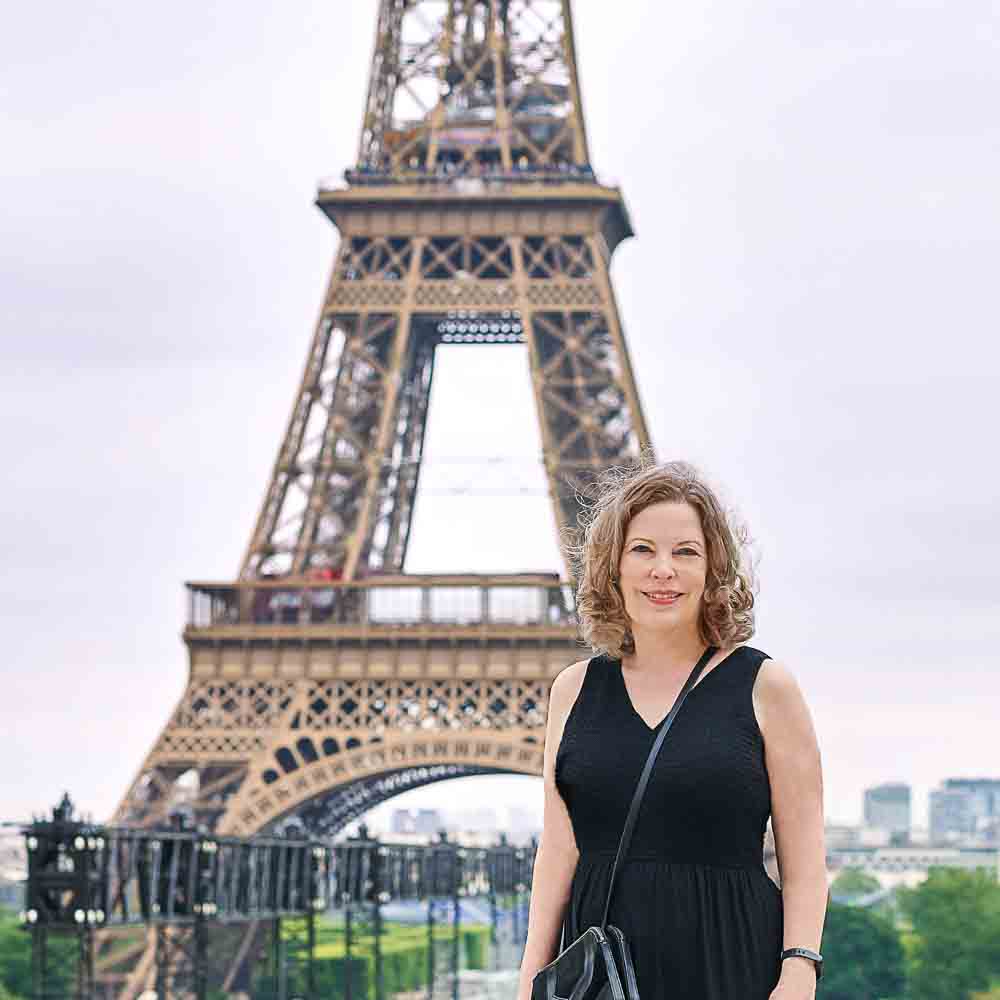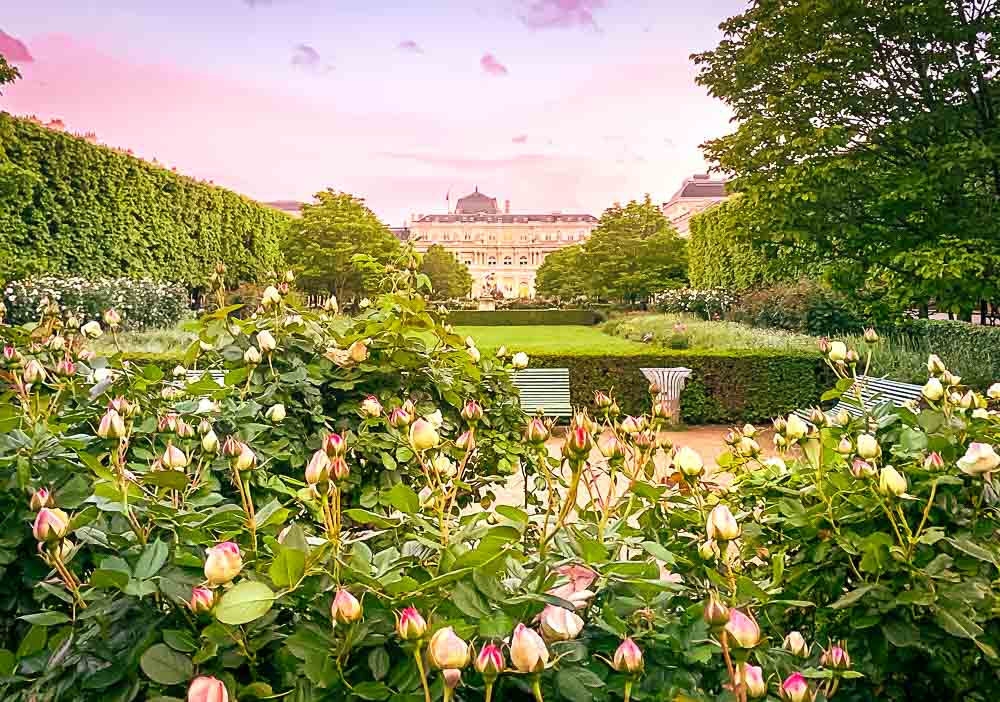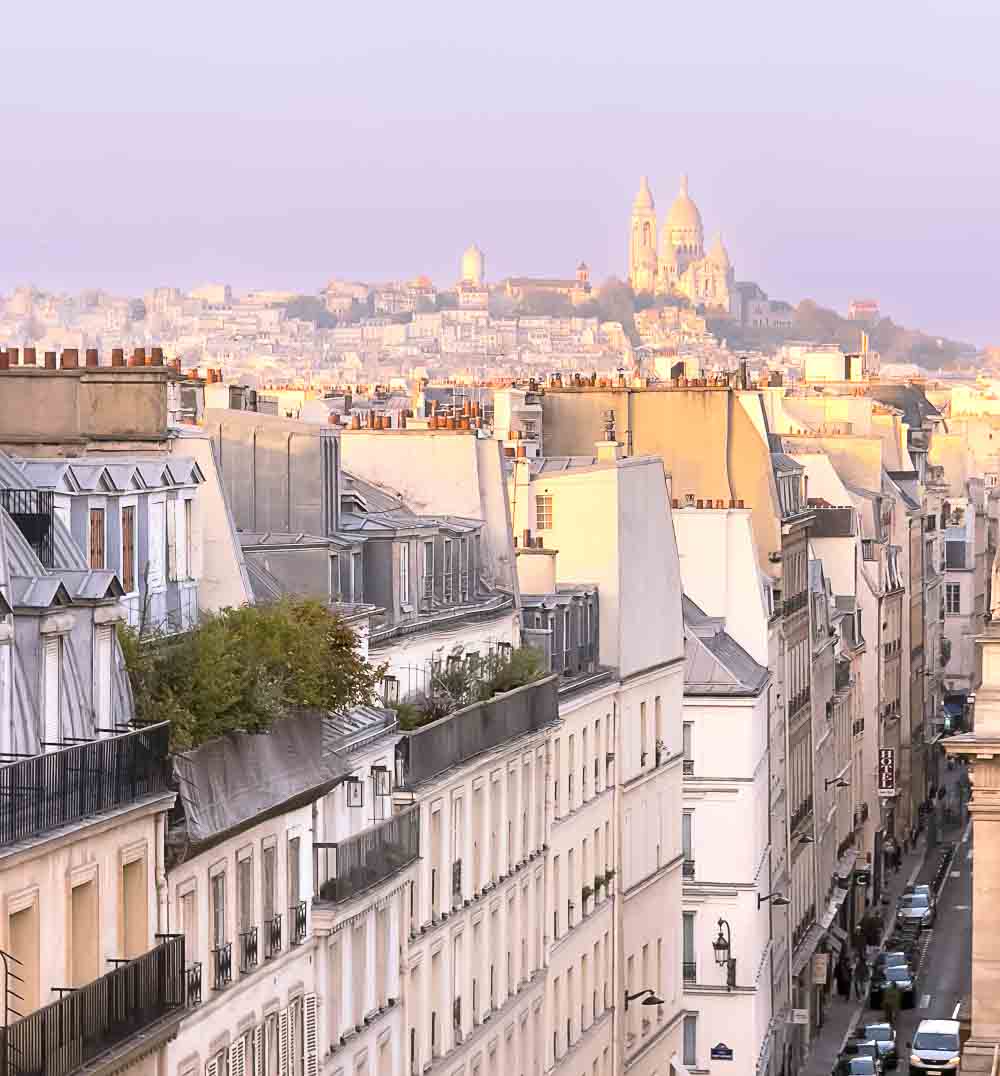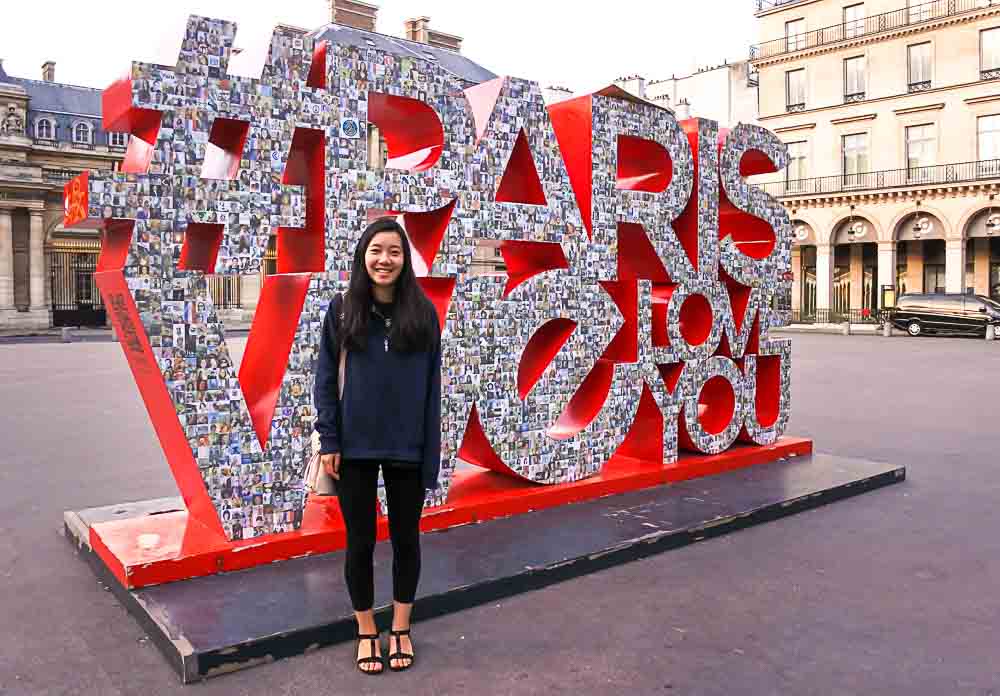Les Puces - Paris's famous flea market at Saint-Ouen or to be more formal, Le Marché aux Puces de Saint-Ouen at Clignancourt - attracts visitors from all over the world as well as Parisians in search of bargains, treasures, or just a fascinating way to spend a weekend afternoon.
With over 3,000 vendor boutiques, stalls, and showrooms packed along a maze of lanes and alleys plus cafes, bars, and sidewalk vendors, Les Puces covers close to 20 acres and is the world's largest antiques market and the best flea markets in Paris if you're looking for high quality and the biggest variety of, well, basically everything.
If you know where to look, you can find everything from museum-quality 17th century furniture and 18th century crystal chandeliers and gilded mirrors to vintage Chanel shoes, from Hermès' Berkin bags and rare Patek Philippe gold pocket watches to Art Deco objects from the 1930s and American leather jackets from the 1960s.
Explore Les Puces with an Expert Guide
Due to the immense size of the Marché aux Puces, an expert guide can save you a lot of time by leading you into the market past crowds of vendors outside the market entrance, showing you the best vendors, and giving you bargaining tips.
This is our top tour pick based on our own experiences:
- Paris Flea Market Insider's Tour - Introduction to the market's layout plus tips about negotiating; small group tour with a max of about 10 participants; the guide will usually customize the tour on the fly if participants have special interests
Will you find bargains at Les Puces?
Maybe... maybe not. Most items sold at Les Puces tend to be fairly priced by savvy dealers, with prices ranging from affordable to sky-high. But sometimes you can score a real bargain.
In this article, we share our tested and proven top 10 tips for getting the best shopping experience at Les Puces, including a negotiating ploy or two.
Although remember, when you spot something you love, your passion may overrule your wallet.
And that's ok, because the real reason to shop at the Paris Flea Market is simple: You go to Les Puces for the thrill of finding the treasure of your dreams: something spectacular, unique, and wonderful.
Whether you spend just a little or indulge in a high-end splurge, you'll bring home something you'll cherish - something that makes you smile every single time you look at it.
Top photo: Browsing at Les Puces, the biggest and best flea market in Paris, (c) Paris Discovery Guide
Paris Discovery Guide is a reader-supported publication. When you buy through my links, I may earn a small commission at no additional cost to you. Merci beaucoup for your support!
Tip 1: Know What to Expect at Marché aux Puces, the Biggest & Best Paris Flea Market
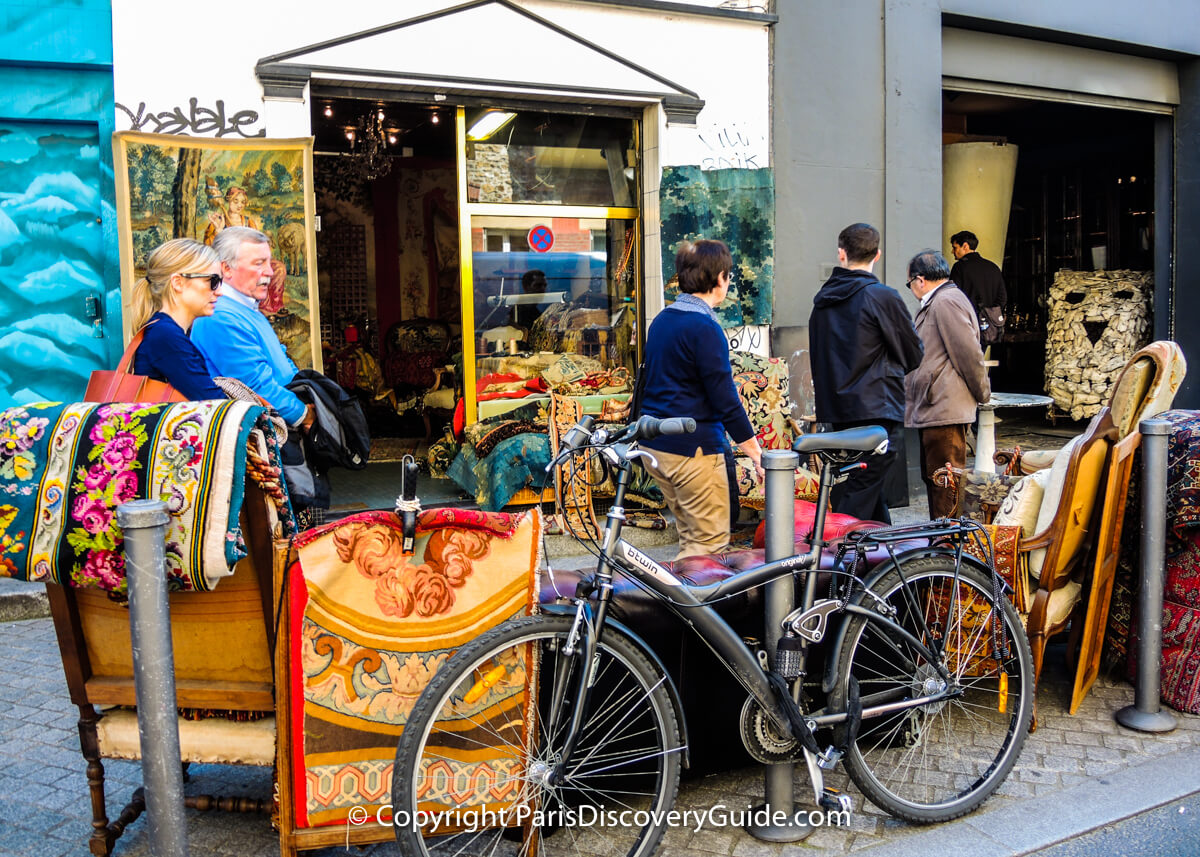
Prepare yourself - the Paris Flea Market may NOT be what you expect - especially if you're used to shopping at more traditional flea markets where junk far exceeds quality and genuine treasures run scarce.
As soon as you enter the Marché aux Puces, you'll realize it's not a single market - it's a community of 14 antique and flea market emporiums sharing the same location, plus hundreds of independent dealers who work on their own.
Think of Les Puces as a small city filled with shops crammed along the main street, Rue des Rosiers, and a maze of small lanes and alleys branching off of it.
To get a sense of the market's scale, consider this: over half of these 14 markets each contain hundreds of individual shops and stalls.
Two markets are for large-volume professional dealers only, and two sell mainly new clothing - but that still leaves 10 markets with shops, stalls, and showrooms overflowing with vintage and antique treasures waiting for your discovery..
Some markets occupy stand-alone buildings and stalls, as in the photo above showing a tiny section of the charming country village-like Marché Vernaison.
Others such as Marché Antica offer store fronts along buildings stretching down entire blocks, while still others such as Marché Dauphine provide fancy multi-level market buildings designed to showcase each merchant's items, sometimes with sections devoted to specialties such as art, antiques, fashion, or music.
The Paul Bert-Serpette marché, due to its size and its exquisite displays of precious antiques, resembles a carefully curated gallery or museum.
Each market has its own ambiance and specialties, and if you visit often enough, you're likely to develop favorites.
When Can You Visit Les Puces?
Les Puces is only open three days a week: Saturday, Sunday, Monday: 10am until about 6pm.
Be aware that hours may vary by market and by dealer; a few may open earlier than 10am, and some close before 6pm on Mondays.
Many dealers typically go on vacation for all or part of August, especially during the first two weeks of the month, and may also be closed between Christmas and early January.
Tip 2: Choose a Paris Flea Market Tour
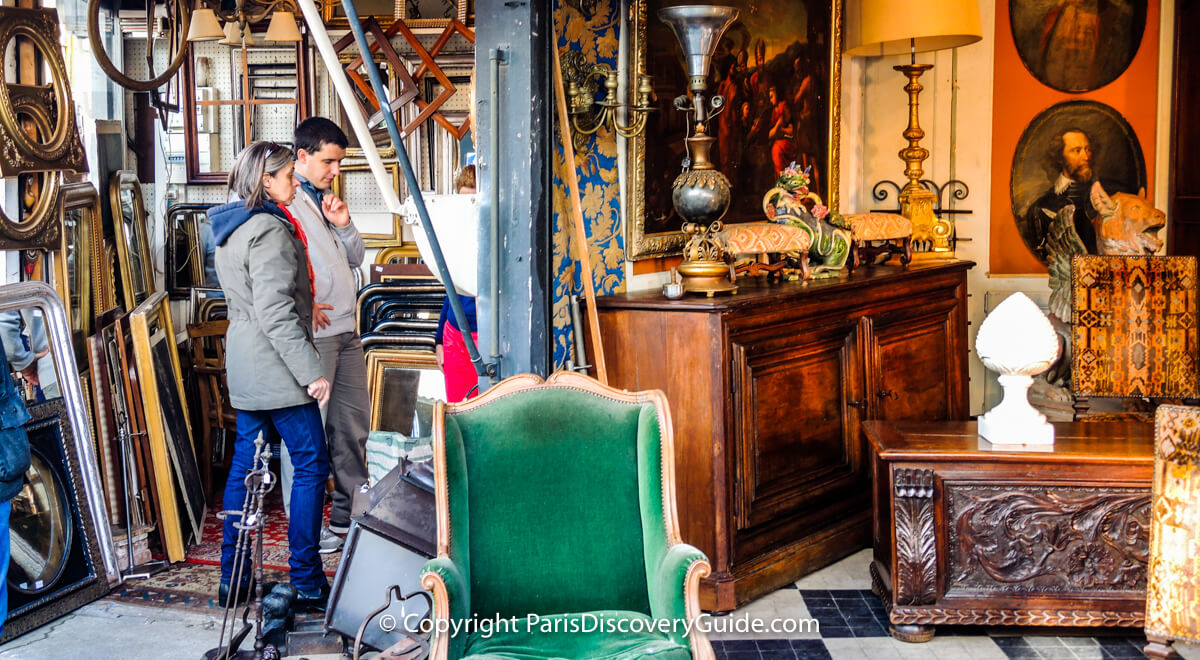
Even for frequent visitors, navigating through the crowds at the Paris Flea Market can feel overwhelming, especially on warm sunny afternoons when you'll feel squeezed like a sardine among hoards of other shoppers and can barely see where you're going. On super-crowded days, you may not be sure where the crowds of street vendors end and the "real" market begins.
Visiting Les Puces with a Paris Flea Market tour where the guide will customize based on the group's interests can save you time, money, and stress, especially if:
- You're making your first visit to Les Puces and want to see the best parts of the market
- You want to shop for specific types of items
- You want help with negotiations and possibly arranging for shipping (especially if you're not fluent in French)
Here is the tour we recommend:
- Paris Flea Market Insider's Tour - This walking tour of the Les Puces Paris Flea Market gives you an excellent introduction to the various market areas and specialty shops. Your guide will give you tips on how to bargain, how to distinquish quality from garbage, and will show you some of the best and most unique "insider's secrets" shops and stalls.
Tip 3: Understand Les Puces Markets & Their Specialties
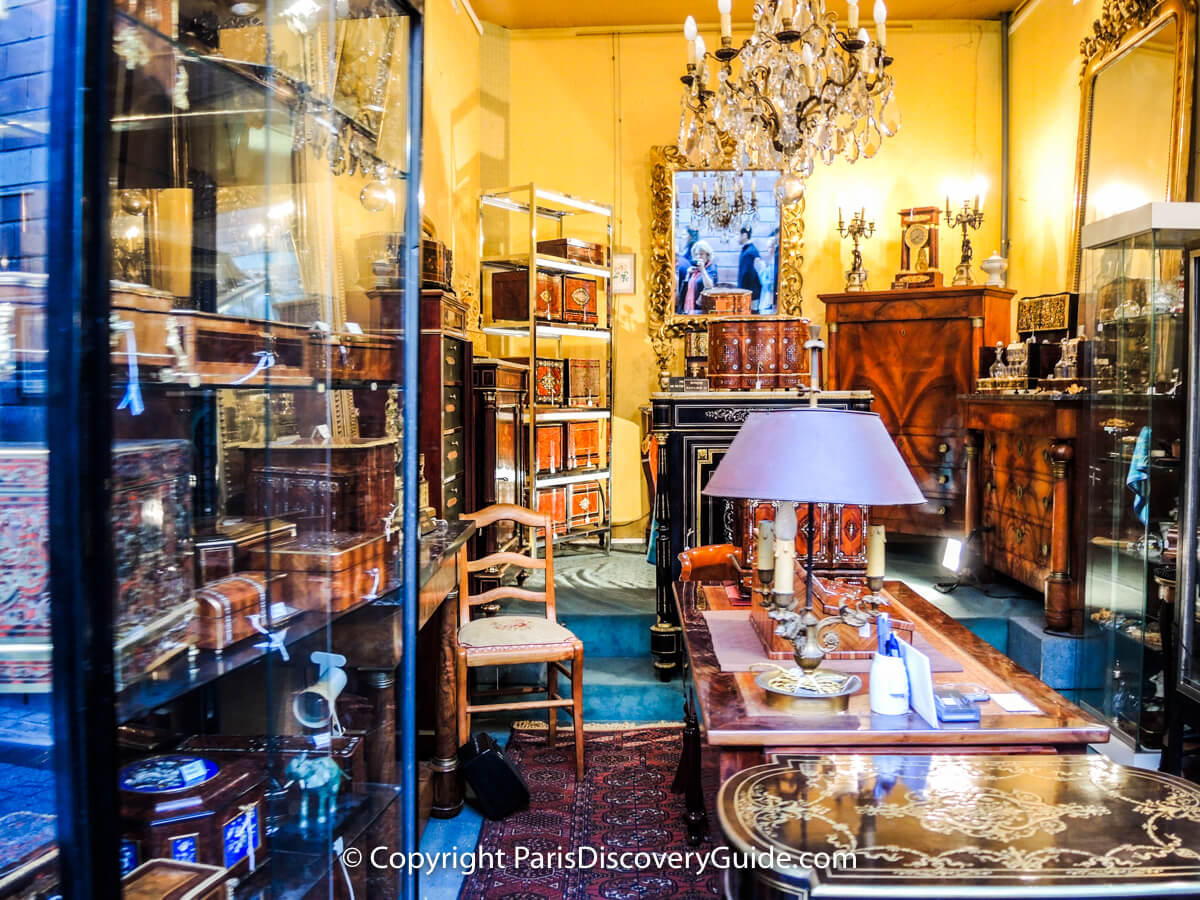
Here's a quick "tour" of what you might find at each market, starting with Marché Malassis, the one closest to the Porte de Clignancourt metro station, almost directly across the Boulevard Périphérique (the multilane, always jammed highway that encircles Paris):
Malassis
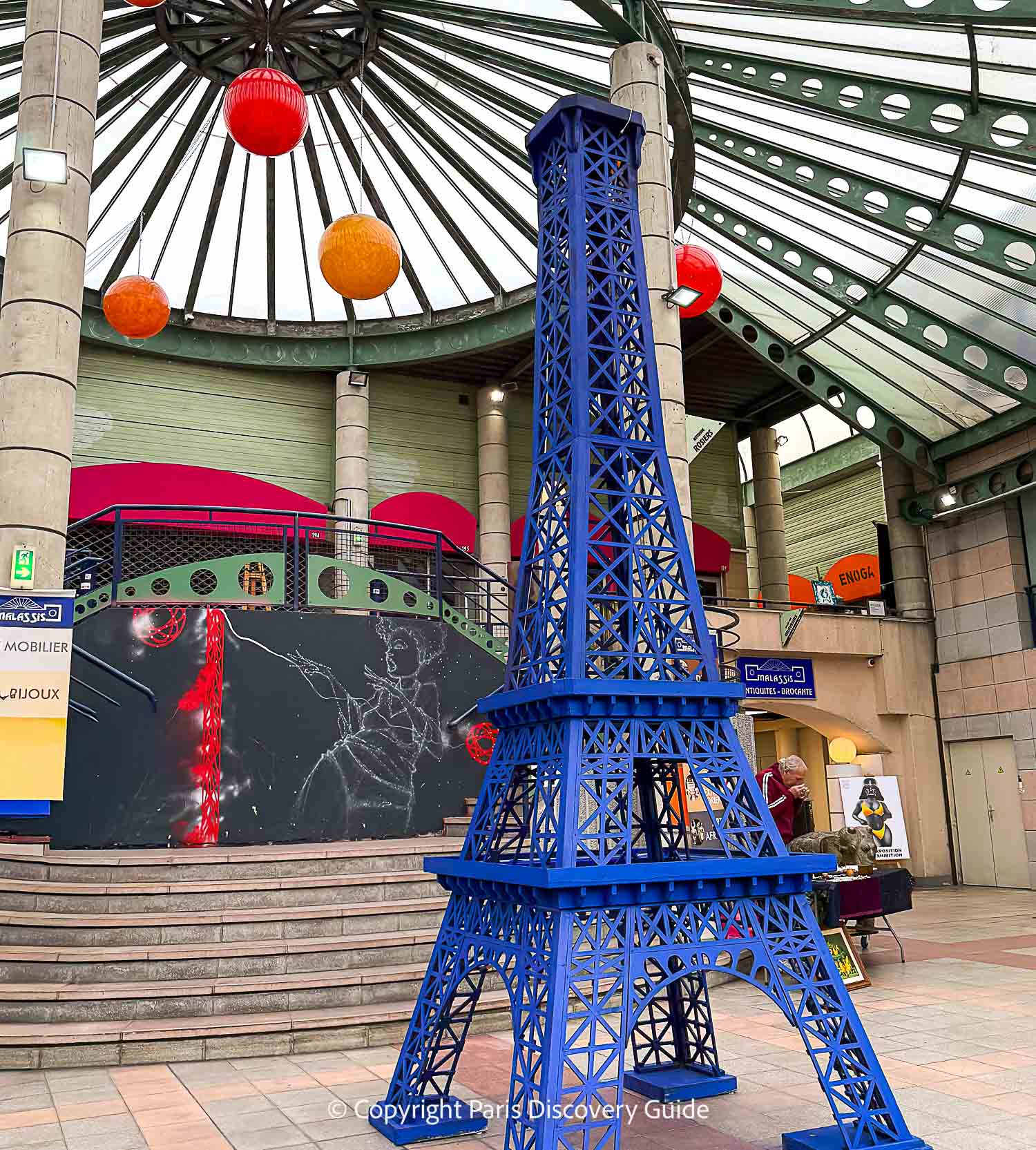
Several hundred merchants and artisans with items ranging from 18th century to modern, including lots of restored furniture, Asian collectibles, tableware, art, affordable jewelry, maritime items.
Malassis is especially strong in 20th century items - think Art Deco and Mid-Century Modern.
Vernaison
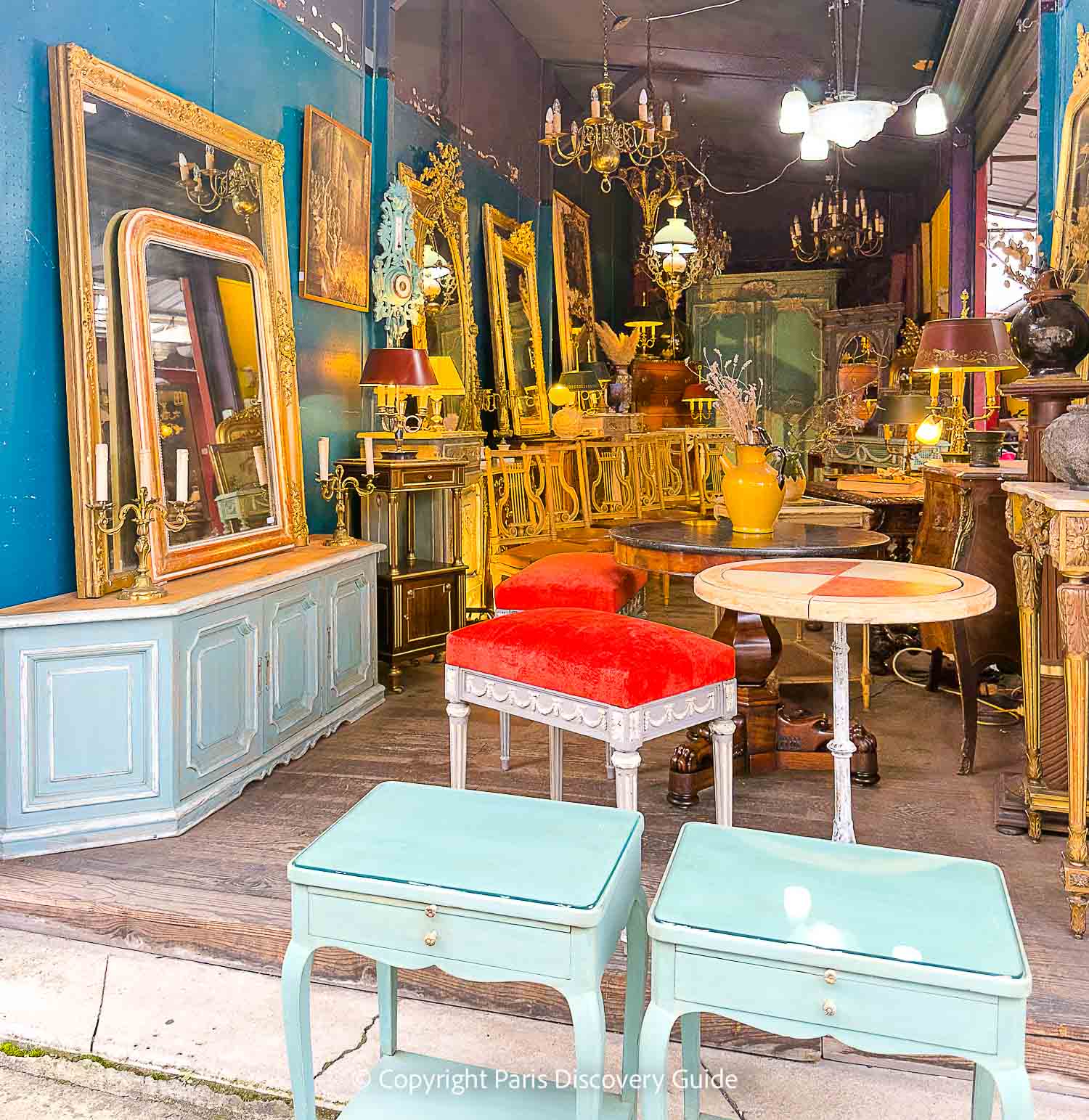
The first market you'll come to after you pass through Les Puces' official entrance (and after you ignore all the street vendors along the way) is Marché Vernaison, which you'll see on your right. (Consult the map in the next section for a visual overview.)
With over 300 stalls and shops scattered along its labyrinthine alleys, Marché Vernaison dates back to Les Puces' early beginnings.
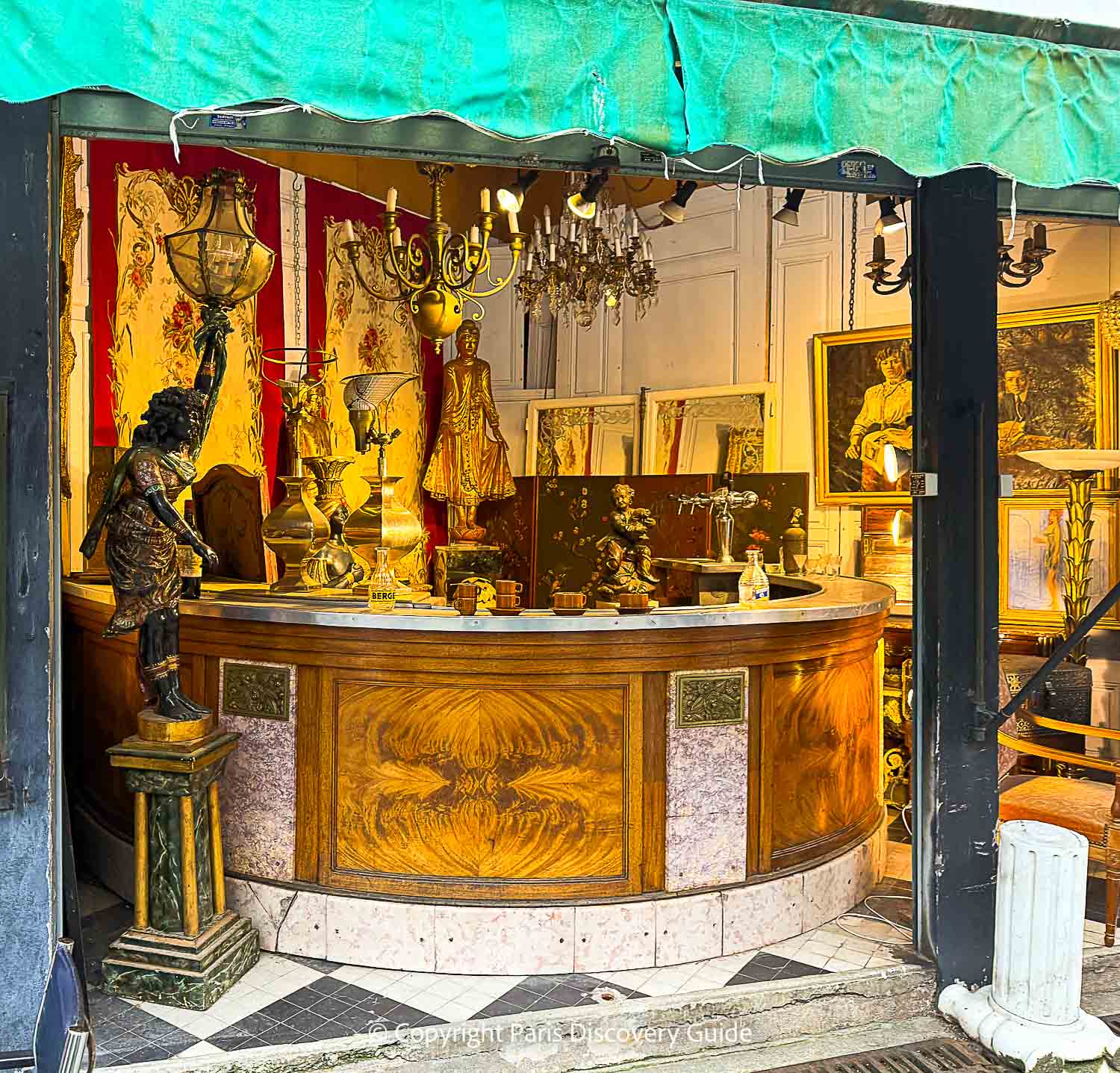
With so many wonderful choices, you always have a good chance of finding the perfect piece here, and sometimes even the possibility of a bargain.
You can find literally everything here (except for the most precious antiques) - furniture, tableware, crystal, picture frames, vintage clothing, gilded mirrors, vintage posters, lighting fixtures, art, costume jewelry, buttons, beads, garden statues and ornaments, ceramics, toys, art, dolls, clocks, watches, - well, you get the idea.

Because of its size, the Vernaison Market includes both large buildings housing numerous shops under one roof as well as many lanes lined with individual shops.
If you see something you like and want to come back to it, take photos along the way (like a trail of breadcrumbs) so that you can find your way back.
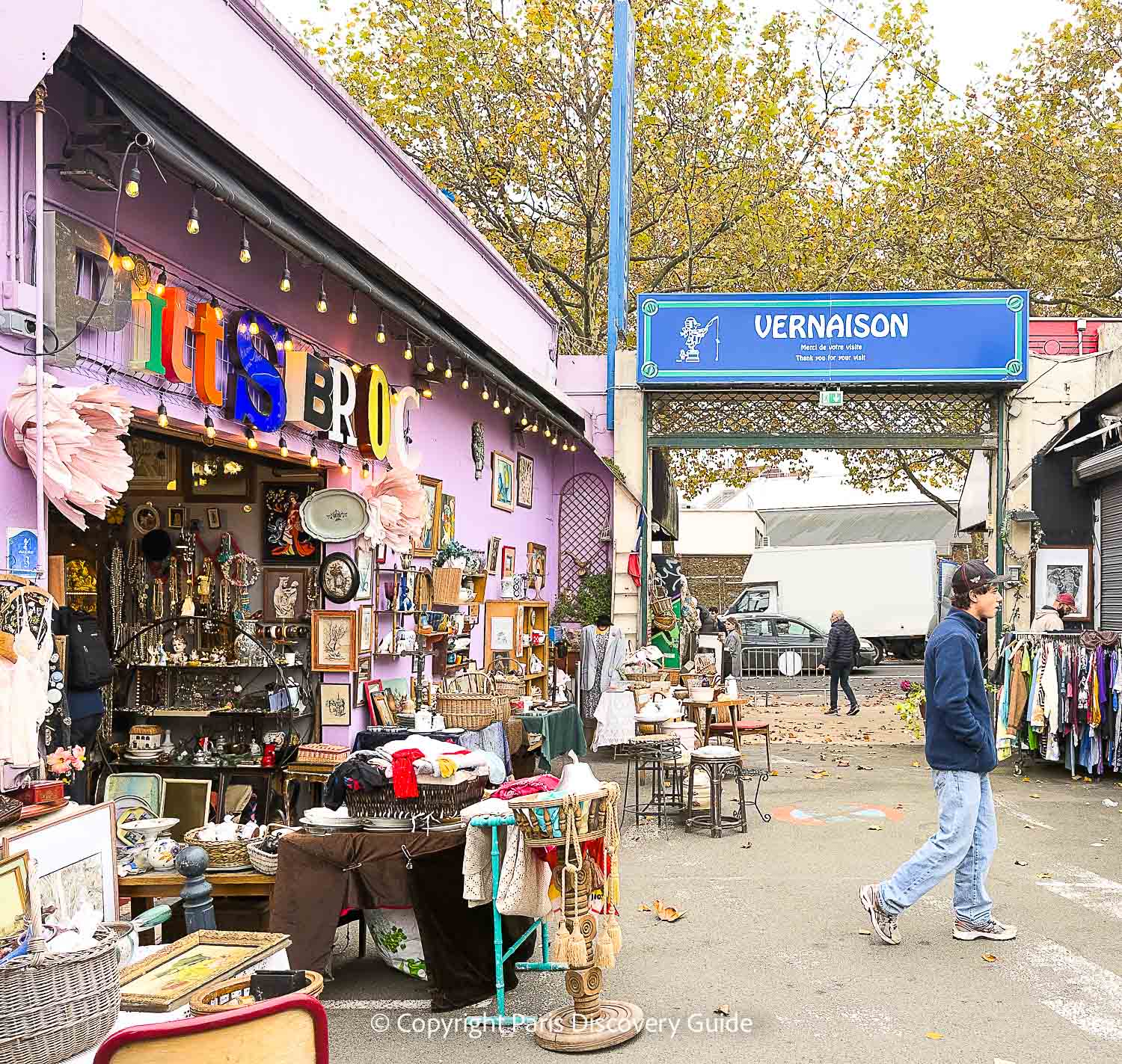
Tip: You can easily spend an entire day in just this one market. But if you want to see the rest of Les Puces, force yourself to move on - much, much easier said than done.
Antica
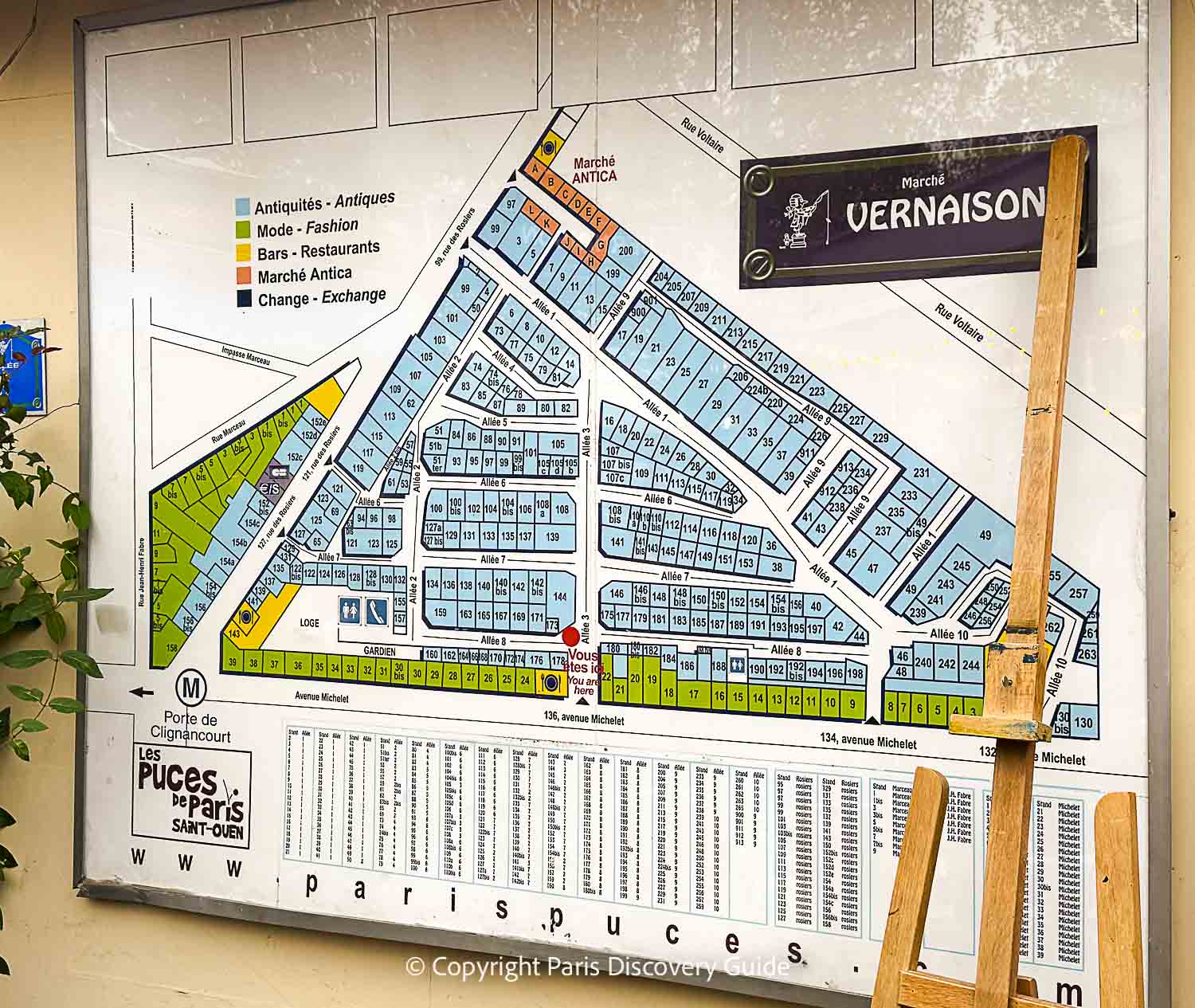
Can you spot Marché Antica at the top of this map of the Vernaison Market? Look for the small brown area.
Marché Antica is carved out of a corner of the Vernaison Market, and is perhaps the smallest of the markets.
About a dozen stalls offer small furnishings, jewelry, art, rugs, many from the 18th and 19th centuries.
Dauphine
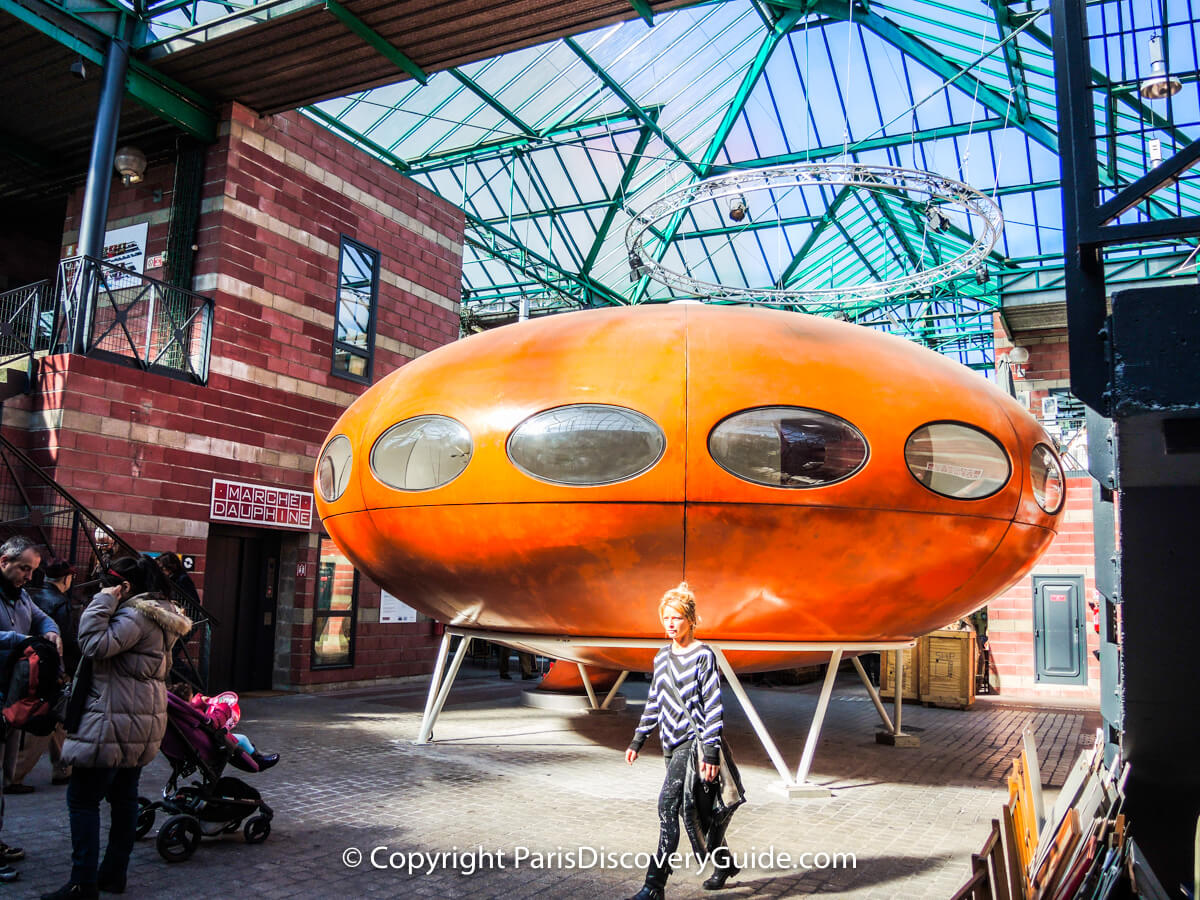
Over 150 dealers occupy Marché Dauphin's gorgeous new glass-roofed building and offer a wide variety of antiques, collectibles, and second-hand goods organized by specialty: furnishings (17th -20th century) art (19th and 20th century), antique books, old toys, and even 20th century industrial art and vintage clothing and corsets.
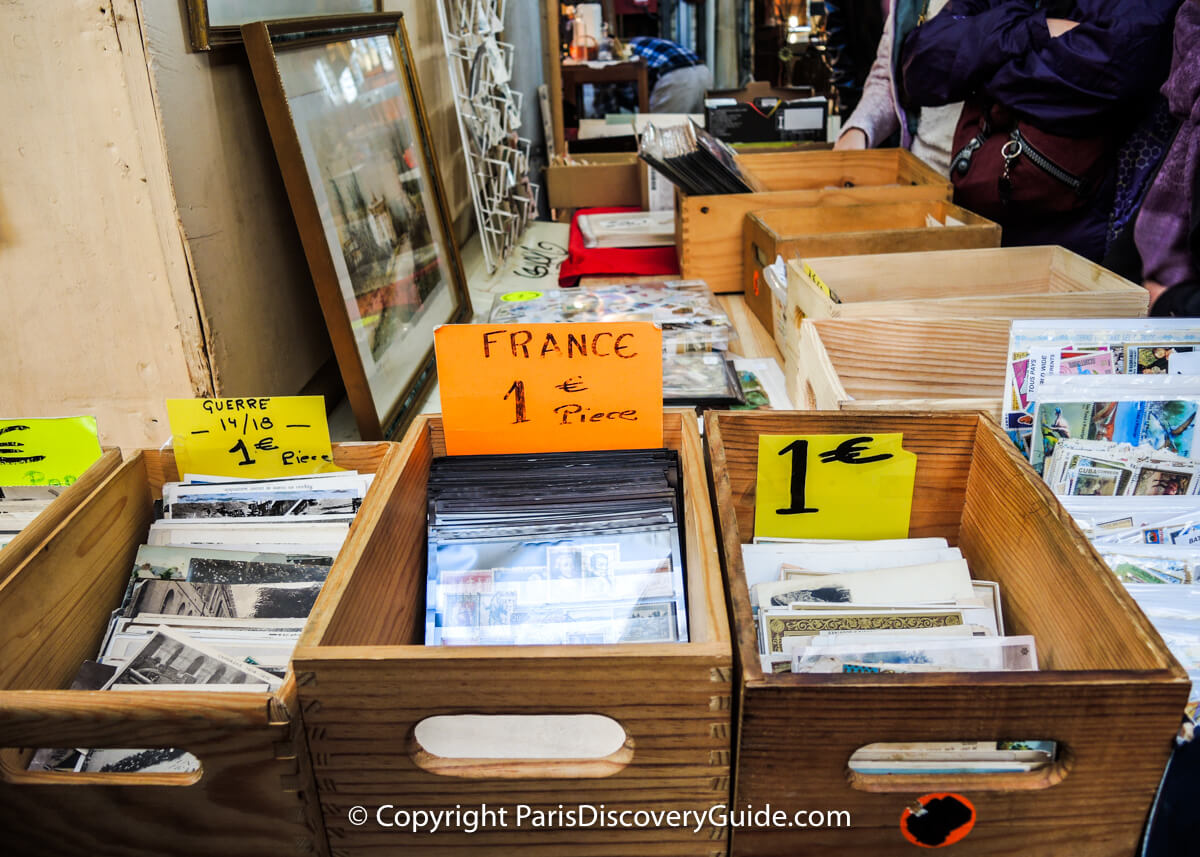
Biron
About 220 antique and art dealers specializing 17th century antique furniture in various categories (Parisian, French Provincial), jewelry, art, decorative objects; you'll also find specialists in 18th, 19th, and 20th century (especially Art Deco) furnishings and art.
You should expect prices not so different from those in Parisian antique stores, although they are competitive - the sheer quantity of vendors means that they keep their prices fair in order to compete.
The advantage you get by coming here is in finding so many high-quality pieces in one convenient location.
Cambo
Twenty dealers spread over two floors in a spacious former furniture store in what is much more than a furniture flea market.
Look for high-quality furniture, objects, art, musical instruments, decor from the 17th century through the 20th century.
Jules Vallès
Closer to a traditional flea market, with 120 stalls offering with unusual items, collectibles, old uniforms and weapons, military memorabilia, posters, books, and the types of things you might uncover in a forgotten corner of your grandmother's attic.
You're likely to find very few precious antiques, lots of vintage, and affordable bargains.
I've heard that this market is a favorite of movie and theater set decorators who want to find props and even costumes for period productions.
Paul Bert-Serpette
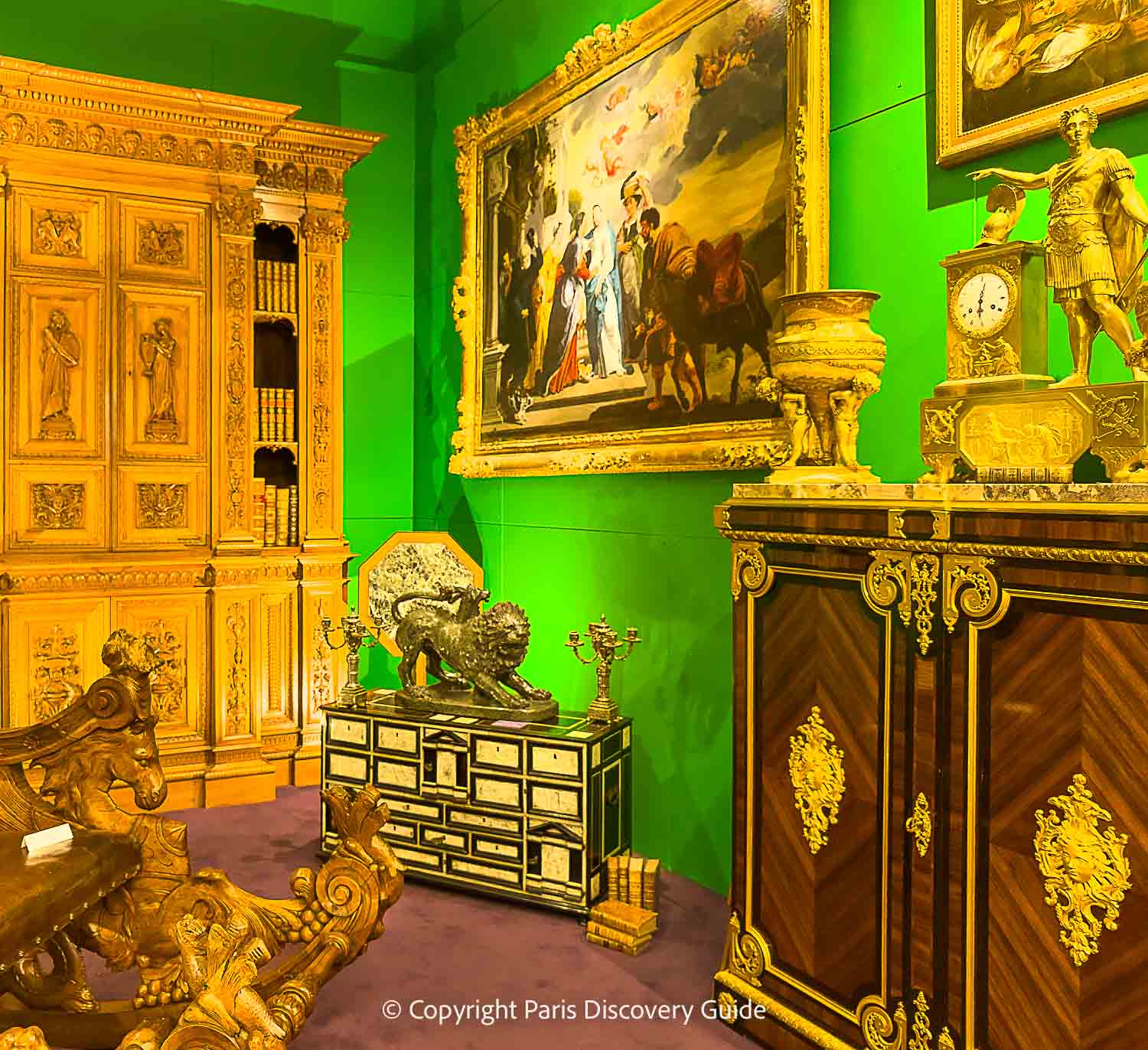
Occupying a large space, Paul Bert-Serpette is the largest antique market at Saint Ouen and in the world.
Over 350 dealers specializing in furniture from all periods, art, gold, tapestries and rugs, paintings, graphic arts and maps, chandeliers, jewelry, mirrors, silver and crystal, vintage clothing, militaria, design, and precious antiquities display their treasures here.
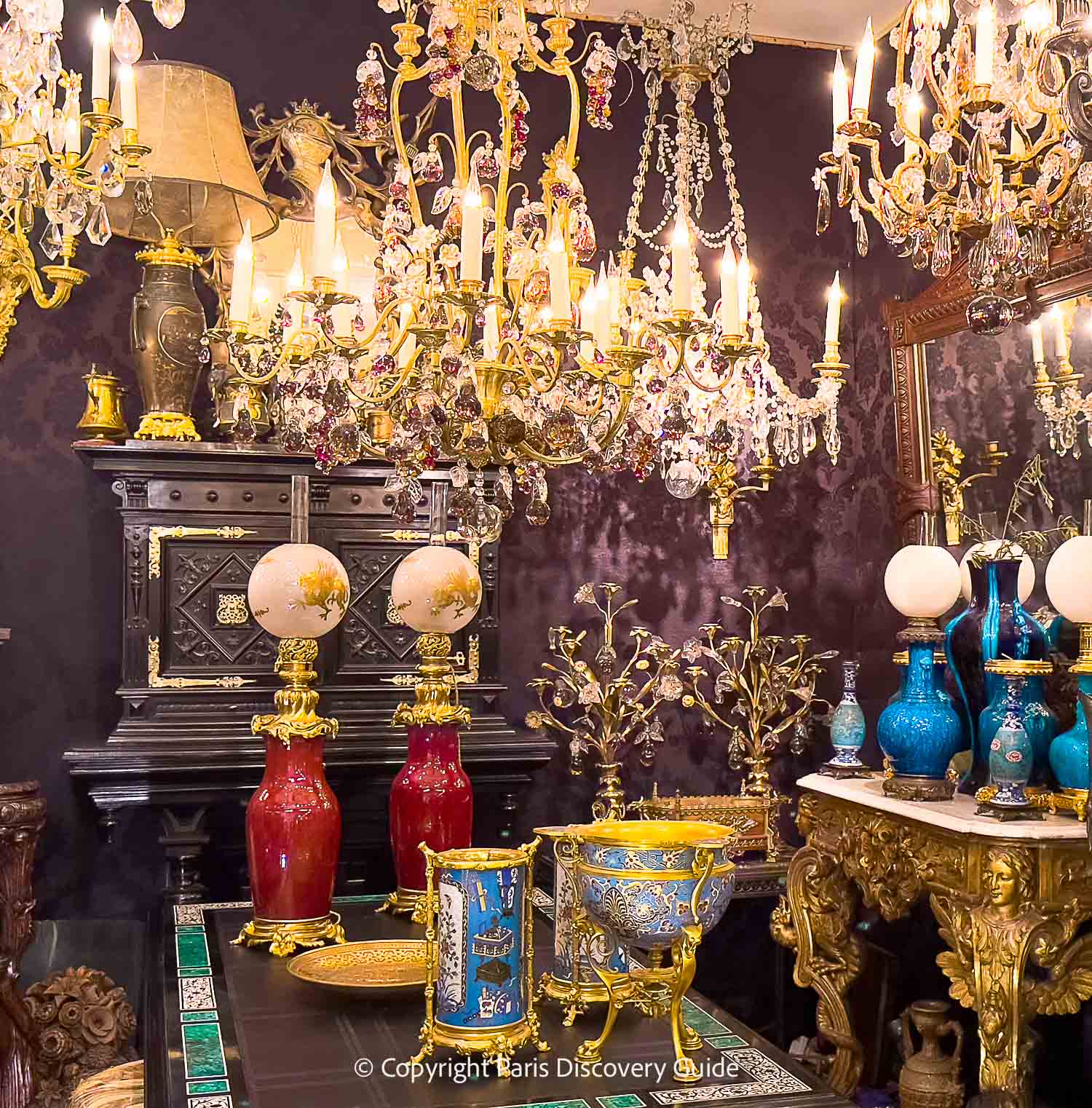
You'll even see examples of high-end design through the 2010s.
It's where contemporary masterpieces go when their uber-wealthy owners want something even newer and trendier.
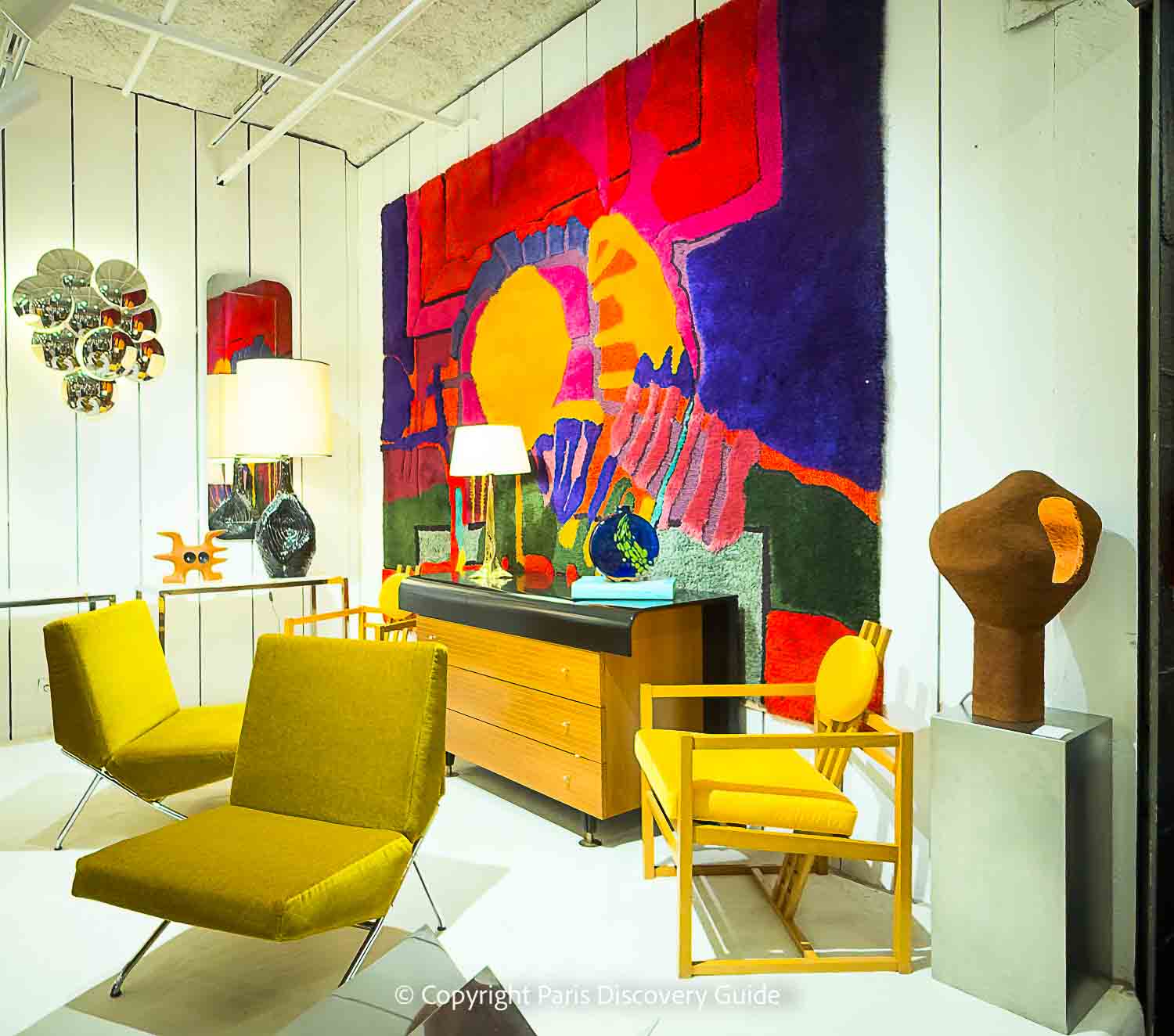
If you want something extraordinary, rare, and beautiful - and if you're able and willing to spend big to get it - this may be the only Paris Flea Market area at Les Puces you need to visit.

L'Entrepôt
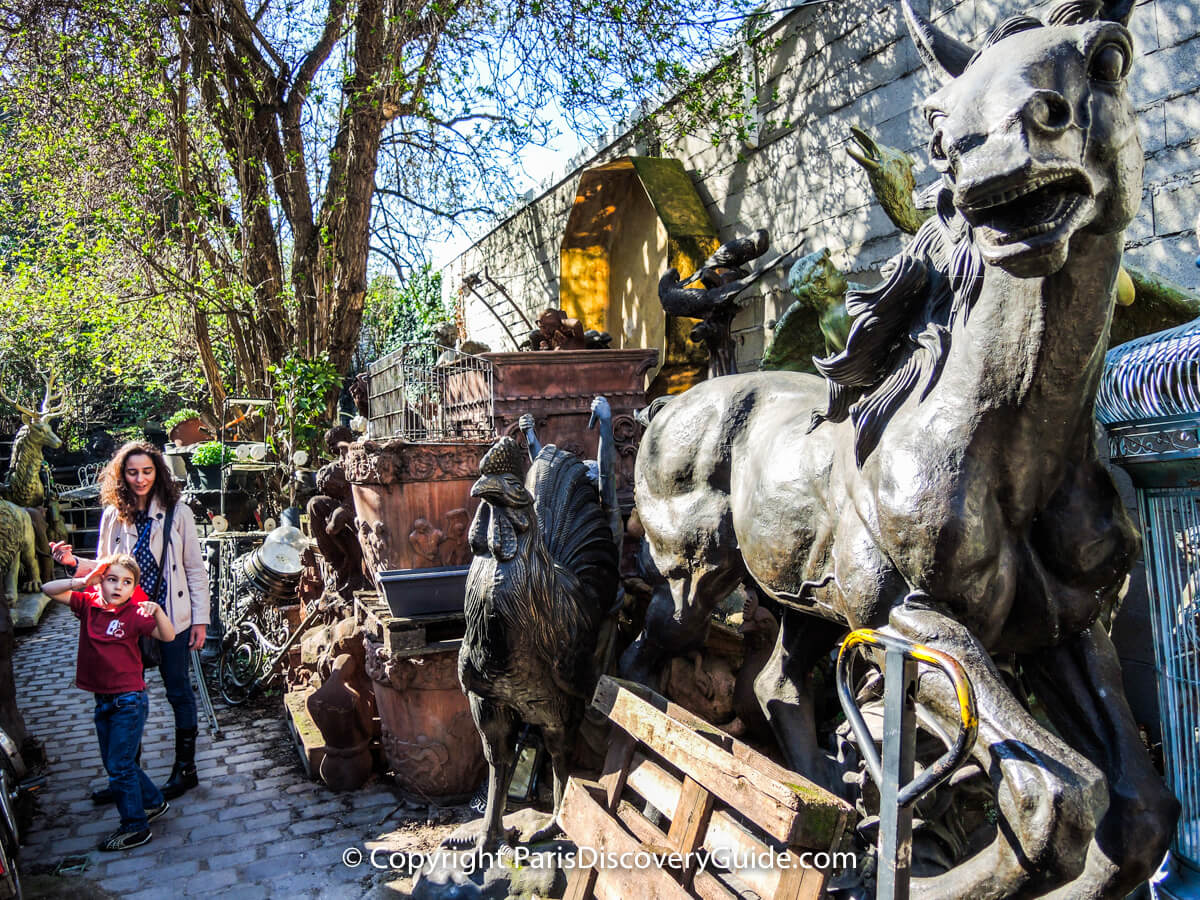
L'Entrepot specializes in large architectural pieces such as staircases, gates, mantles, and gazebos.
If you want to transport an entire paneled library across the Atlantic to the new home you're building, this is where to get it.
It's not unusual to spot interior decorators and their clients in very, very serious conversations here as they take measurements and conduct thorough examinations of the impressive items.
Le Passage
One of the newer Saint-Ouen markets, with mostly 20th century decorative items, furniture, and paintings priced to appeal to bargain hunters.
"Marché des Rues"
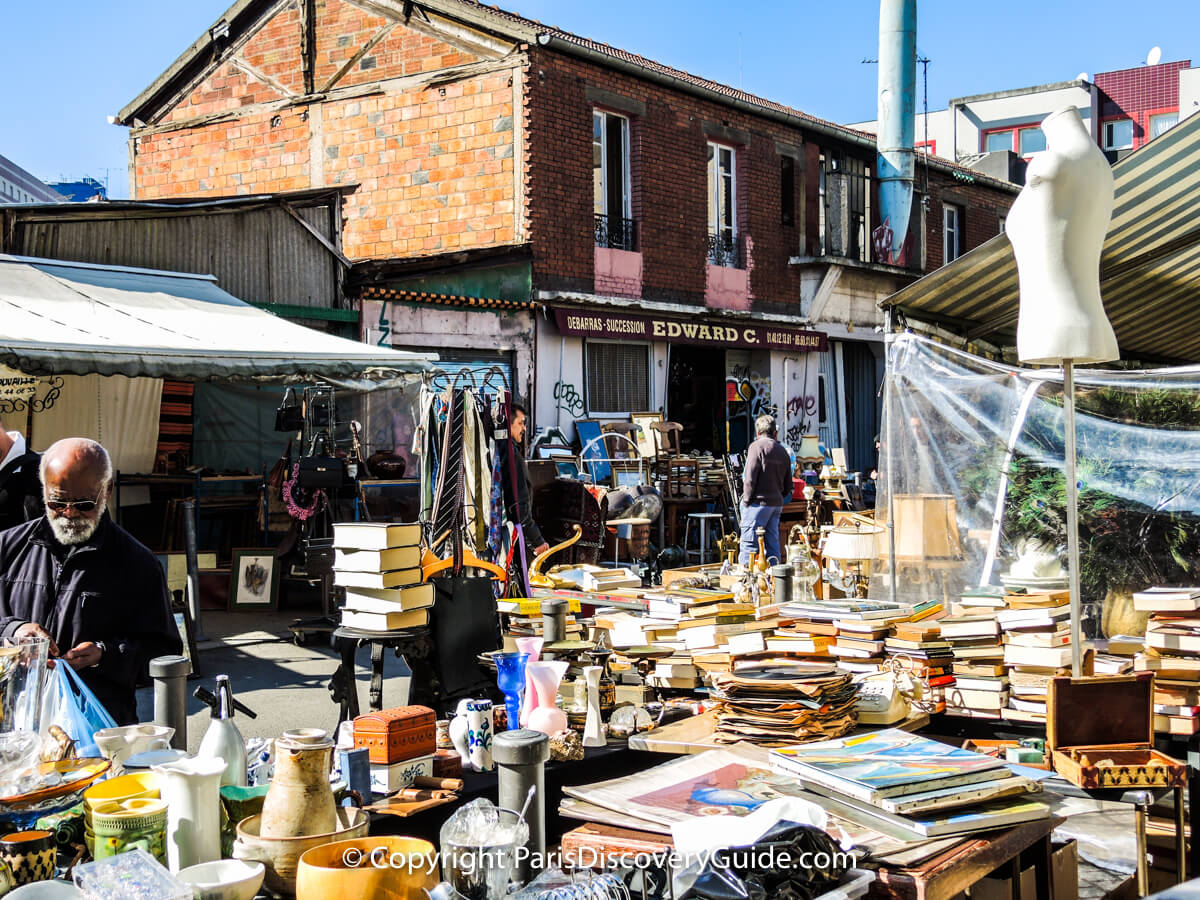
This is the term (you won't see it on the map below) for the collection of the street market vendors and hawkers who line the lanes and alleys beyond the official Les Puces markets offering all kinds of new and second-hand items.
You never know what you'll find here but if you're excited about uncovering a real bargain at the Paris flea market and have time and patience to spare, this is where you should search.
On the other hand, if you're looking for something specific, you'll make better use of your time in other parts of the market.
Malik and Le Plateau-Marché Django Reinhardt
Over 200 vendors selling new and mostly trendy clothing, costume jewelry, and shoes.
Usine and Lécuyer
The Usine and Lecuyer markets are for professionals only who buy and sell in large volumes and export to foreign markets.
They open from Tuesday through Friday, when Les Puces is closed to everyone else - so unless you're a professional buyer, you won't even be aware they're here.
Tip 4: Confused? This Saint-Ouen Flea Market Map May Help!
This map shows most of the current 14 markets as well as main streets and lanes within Les Puces.
Printed maps are sometimes available onsite, especially right after the markets open.
The best places to score a map are usually around the entrances to the Malassis and Vernaison markets - availability is hit or miss, so don't waste too much time searching if you don't spot one easily.
Please note: Paul Bert and Serpette, formerly separate enterprises, now operate as one unit. Individual street vendors are mostly on the outskirts, including alleys and paths not shown on the map.
By the way, the Jardin Ephémère (one of the green spots on the map) provides a lovely spot for a break, as long as it lasts (ephémère is the French word for short-lived).
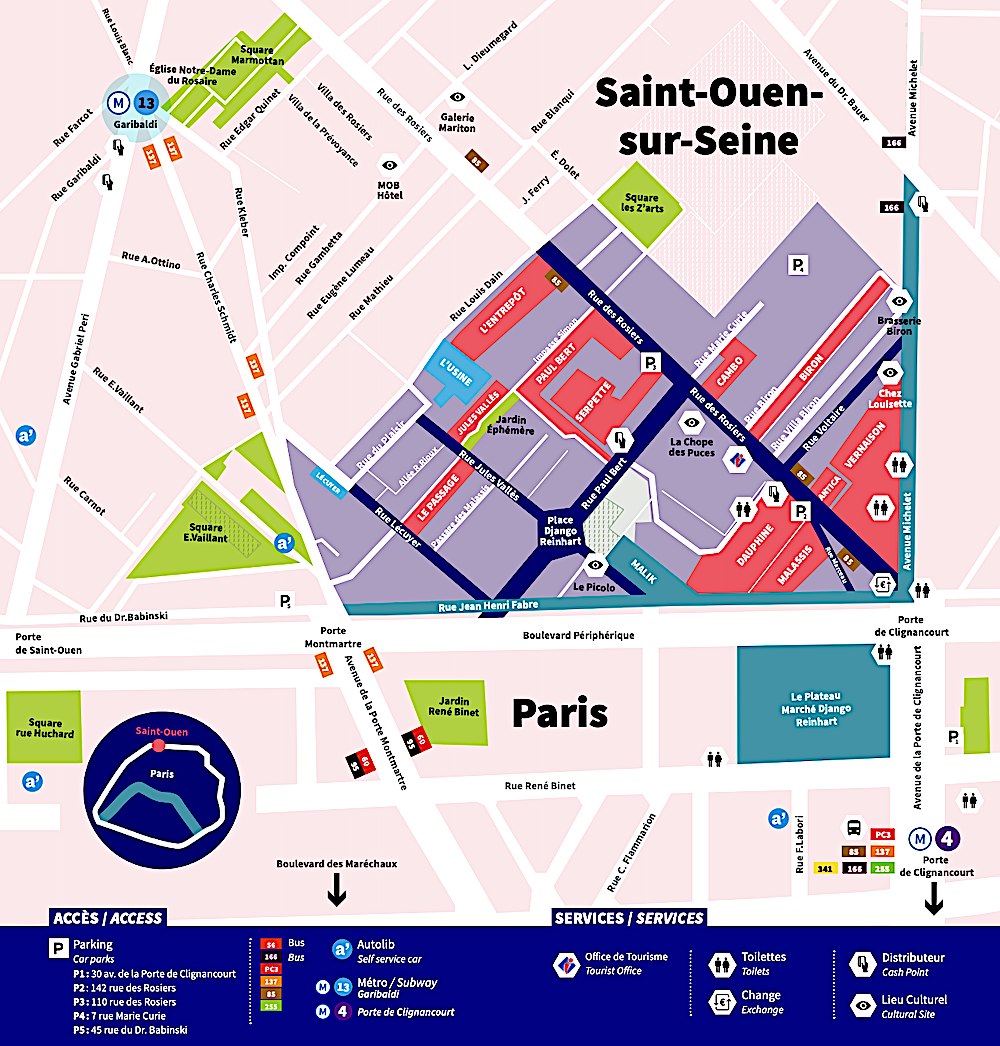
Tip 5: Can You Negotiate at the Paris Flea Market?
Yes, you can certainly negotiate. Some buyers do, while others do not, so no pressure either way. On inexpensive items, spending too much effort on bargaining to save a few Euros may waste time you'd rather spend shopping.
If you're buying something large such as furniture that must be shipped, ask the vendor about the estimated cost of shipping before you decide how much to offer.
You're likely to get the best deals when you buy more than two items from a vendor, or you buy something relatively expensive.
How much discount can you get? Around 20% is a good goal. For one or two inexpensive or moderately-priced items, a 10%-15% discount is decent. Being polite and smiling will help your chances; being rude, unpleasant, or insistent that the vendor should meet your demands most definitely will not.
Enlisting the help of one of the small-group or custom tour guides (see Tip 2) can often get you better prices than you can get on your own, especially if you're not fluent in French. The vendors know that if they give a good price, you'll be pleased with the guide (and perhaps tip accordingly), and the guide will be likely to return again with another tour group.
As with any negotiations, know your spending limit before you start bargaining, have a decent idea of what the item is worth, and be willing to walk away if the vendor doesn't meet your price.
Most sellers in the indoor markets speak at least some English; among the street vendors, English skills vary. If you can muster even a few words of French, do so in order to be polite, and simply write your proposed price (in Euros) on a piece of paper.
The real value in shopping at Les Puces Flea Market comes when you find something unique, beautiful, and irresistible that you'd never find anywhere else. In those cases, negotiate to the best of your (or your guide's) ability - but don't walk away from something you love. Regrets cost more than the Euros you might save.
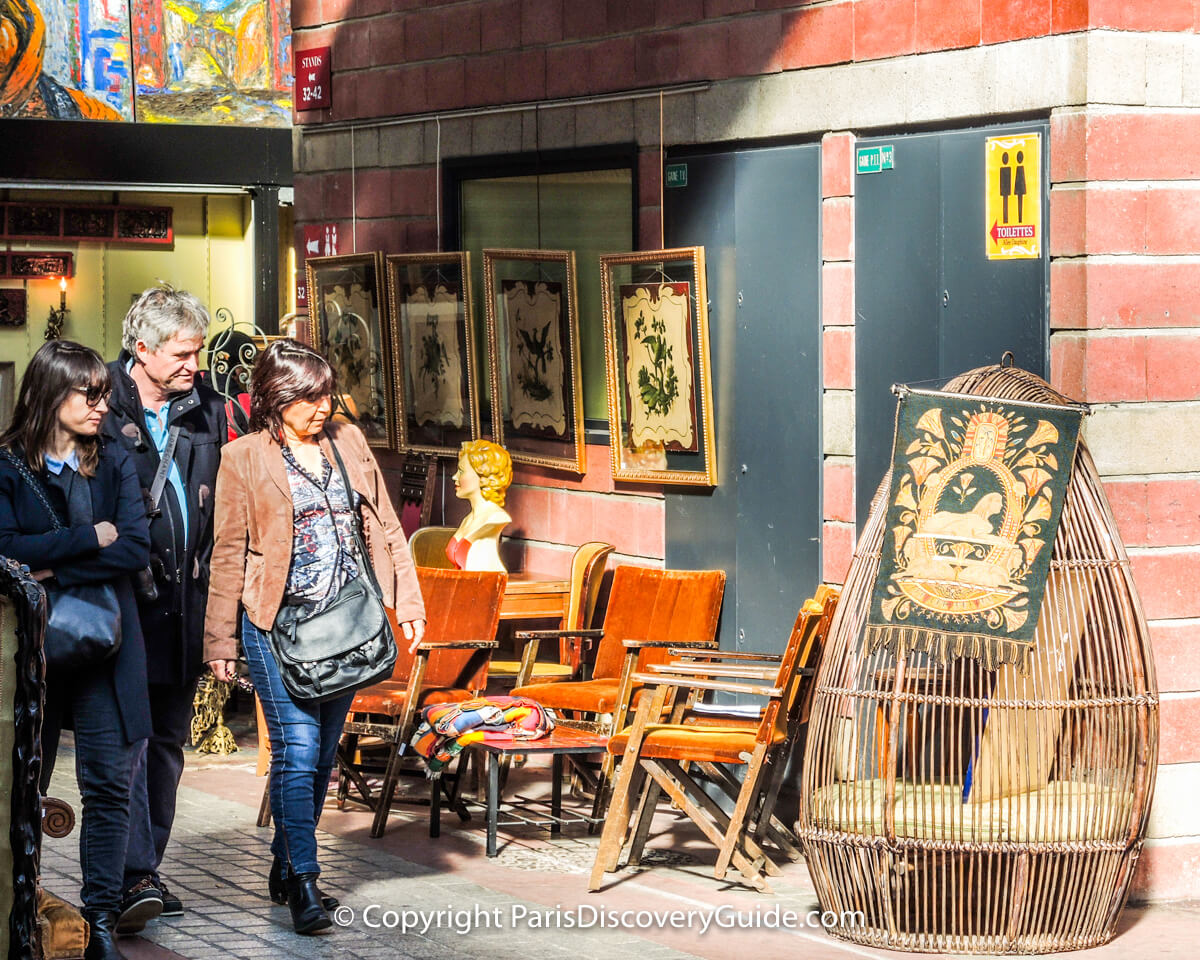
Tip 6: Need More Time at Les Puces? Where to Stay Nearby
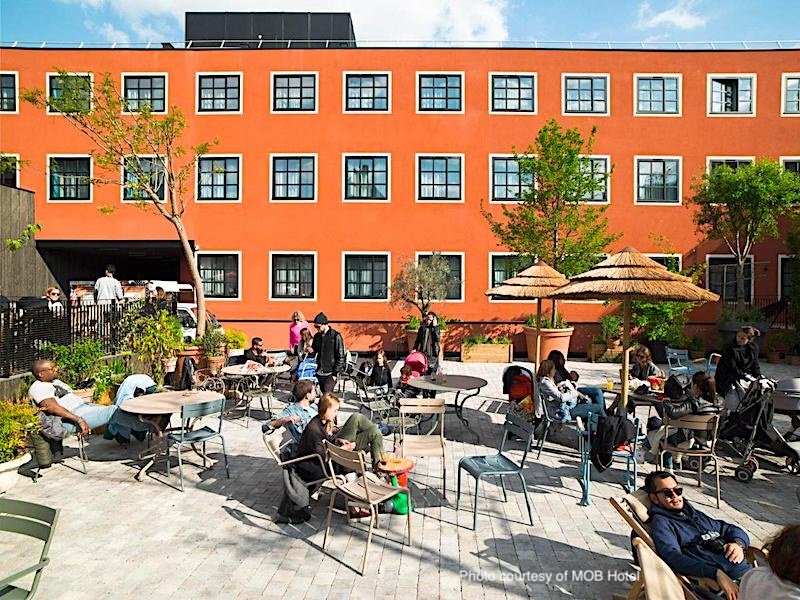
Need more than one day at the Paris Flea Market in Saint-Ouen? Stay overnight at the trendy 3-star MOB Hotel (4-6 Rue Gambetta, Saint-Ouen), just off of Rue des Rosiers and about a 3-minute walk to the market.
With a hip vibe, a popular restaurant featuring mostly organic and many vegan ingredients, terraces off some of the rooms, free wifi, and live music on many nights, MOB Hotel offers lower rates than you're likely to find in Paris - so use the money you save to pay for treasures you can't resist at the flea market.
More hotels close to the Paris Flea Market:
- MOB House (70 Rue des Rosiers, Saint-Ouen) - 4-star hotel (you'll be shocked by the low rates - the advantage to staying outside of central Paris) with a seasonal outdoor swimming pool, fitness center, and garden, with an onsite French restaurant - Book Now
- Café Hôtel de l'Avenir - Stylish decor, a few rooms with balconies, and convenient location across from Garibaldi Metro station; also close to Stade de France, a bonus if you're a soccer or rugby fan and want to catch a game while you're there - Book Now
Tip 7: How to Get to the Paris Flea Market at Clignancourt
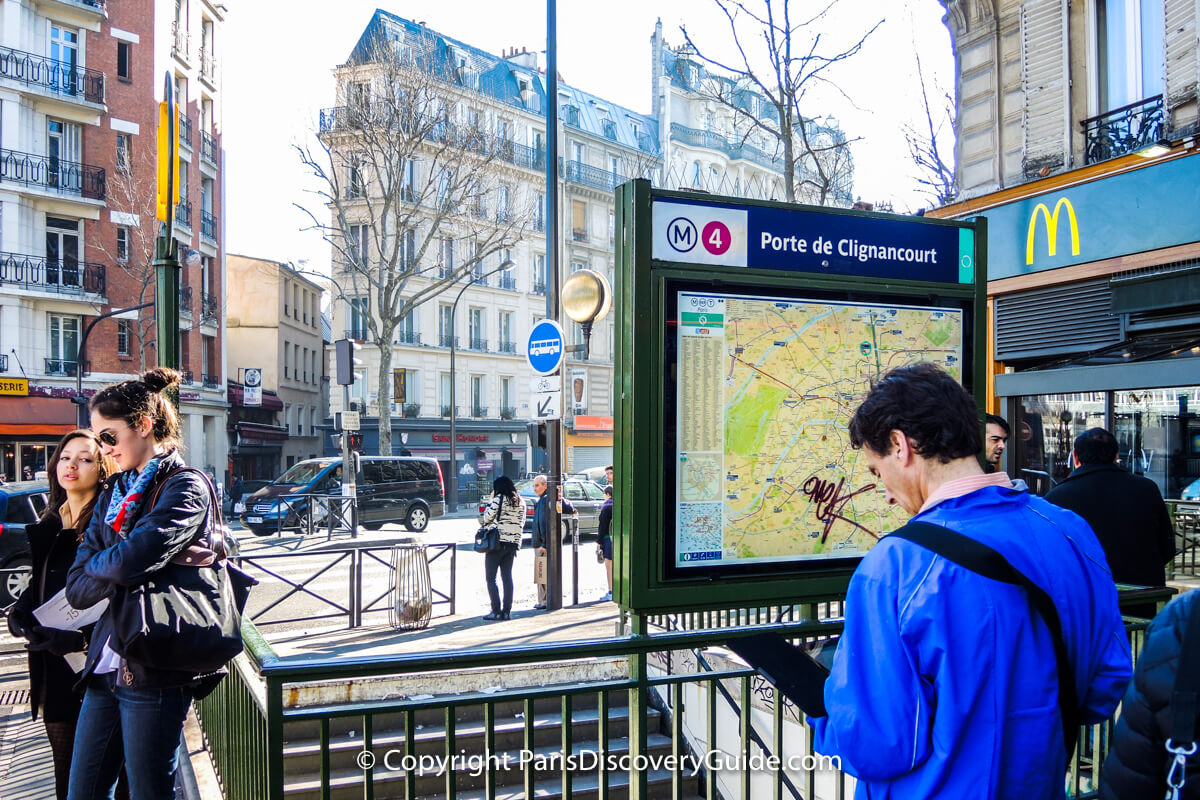
Two different Metro lines take you within a 5-10 minute walk of Les Puces. If you're making your first visit, the most straight forward choice is Line 4 to Porte de Clignancourt.
Take the Metro stairs up to the street level, which places you at the edge of a huge intersection where 7-9, depending on how you count, streets converge. You may be able to see the large overpass for the Périphérique overpass two blocks away; if so, walk toward it.
If not, walk over to the Metro exit next to McDonald's (assuming you exited at one of the others), and with the Golden Arch on your right, walk left. The street is named Boulevard Ornano on this block, but as soon as you cross the large divided Boulevards des Maréchaux, it becomes Avenue de la Porte de Clignancourt.
At this point, you should have a clear view of the Périphérique overpass. Street vendors will try to divert your attention from your real goal, Les Puces, as you walk by but unless you're interested in new clothing and trinkets, keep going because more interesting things await you.
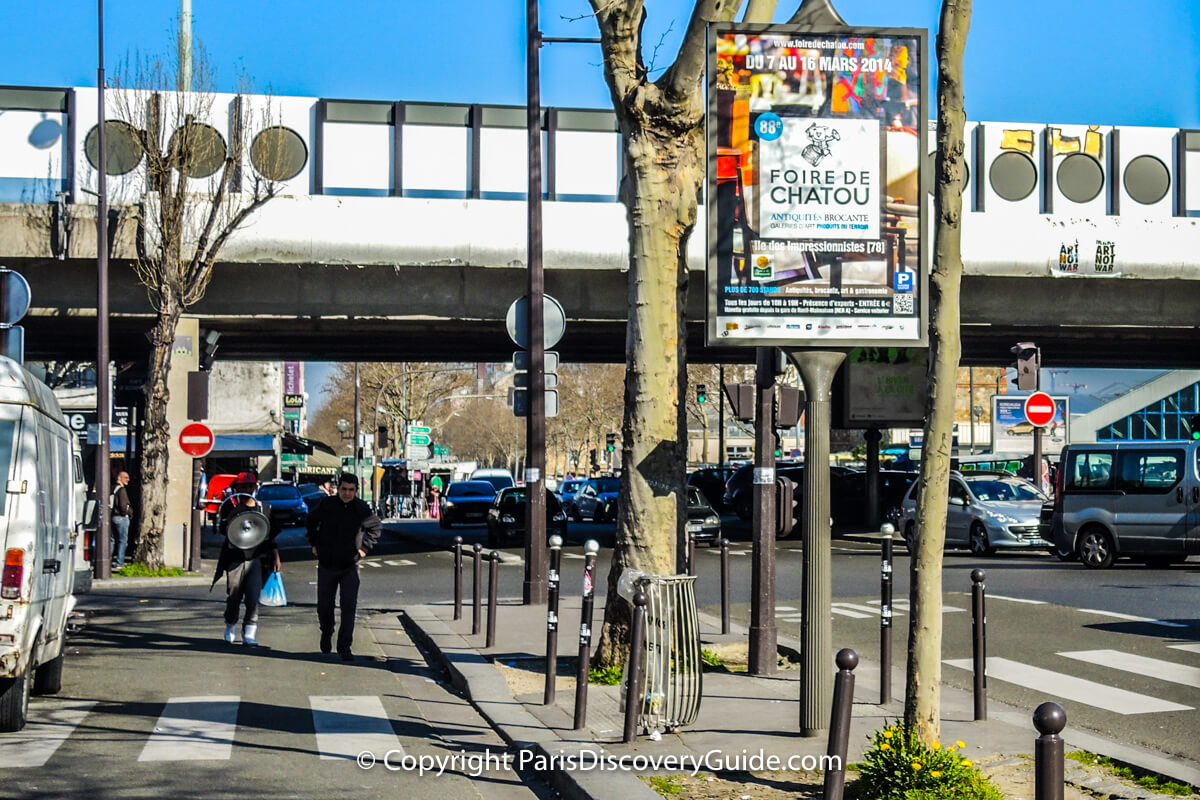
As soon as you walk under the underpass, turn left onto Rue des Rosiers.
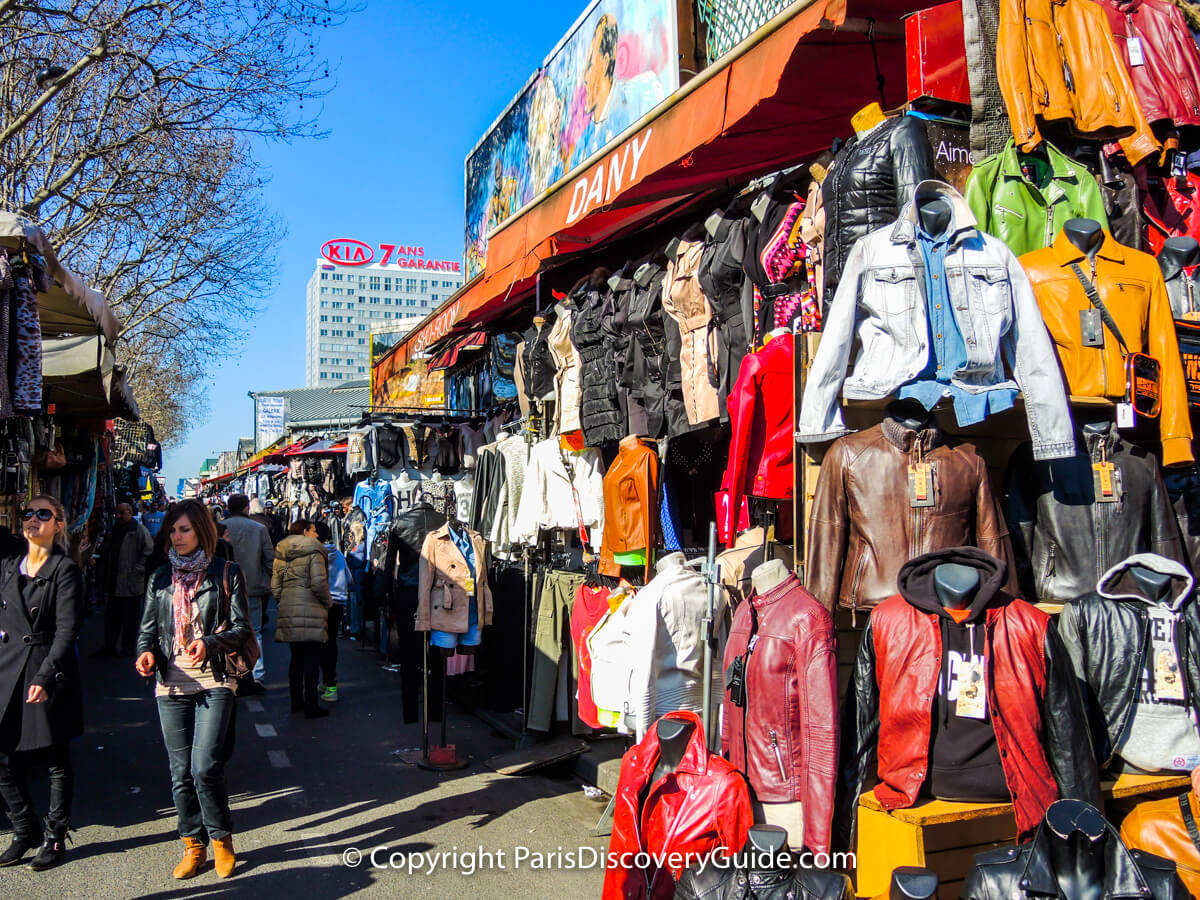
You'll immediately see a bunch of stalls and street vendors selling mostly new clothing, bags, jewelry, toys, and souvenirs.
Can you find some appealing styles and bargains here? Yes, probably. In fact, a lot of Parisian teens flock here for the trendy but cheap faux leather jackets, cute tops, and boots.
But unless this is what you're interested in, maximize your time at Les Puces and its acres of appealing treasures by continuing to walk until you the first two Les Puces markets: Malassis on your left, and Vernaison on your right.
You've now arrived!
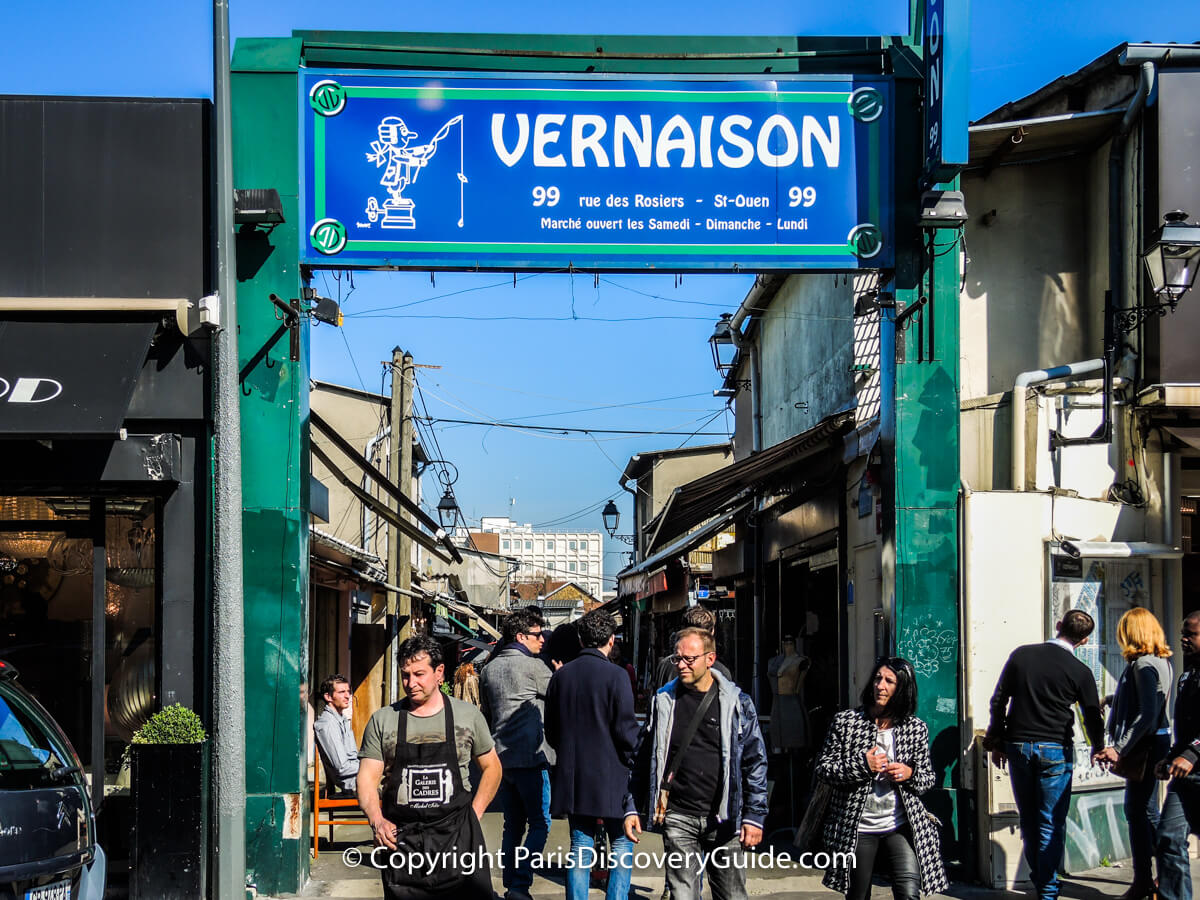
Alternately, take Metro line 13 to the Garibaldi station.
When you exit the station, face north; on your right, you'll see Rue Kléber.
Walk down Kléber for a block, and turn left onto Rue Edgar Quinet, walk for a couple more minutes, and turn left onto Rue Des Rosiers. You'll pass MOB Hotel on your right.
As soon as you spot L'Entrepôt and Paul Bert-Serpette markets on your right, you'll know you've arrived at Les Puces.
Les Puces Savvy Shopper Tips
Especially in some of the narrow streets and alleys outside the permanent Les Puces markets, be aware of the possibility of pickpockets, particularly in dense crowds. (Although in fairness, we've never encountered or seen any.)
Here are our 3 top tips for avoiding problems:
1. Bring only 1-2 credit cards and keep them in a zippered inside pocket.
2. NEVER bring your passport.
3. Do not dress up or wear expensive jewelry or watches, or anything that screams "Tourist!" In fact, dress down. Don't flash your expensive iPhone - it should also go in the zippered inside pocket.
4. To avoid the biggest crowds, come in the morning - or ideally, from early November through early April if your plans are flexible.
5. Consider not bringing cash. If you are sure you won't buy anything, bring just a few euros in case you need an emergency cup of coffee.
But what if you want to buy an irresistable treasure? Here's what you should know: 1) Most vendors at the official markets will accept credit cards (the ones along the street outside the market, maybe - or maybe not), 2) BUT, they prefer cash, and may give you a better deal if that's what you agree to give them, 3) there is an ATM at the market where you can get cash, 4) BUT, lines at the ATM can be long, so be prepared to be patient and think of how much you're saving by not using your credit card.
Tip 8: Where to Eat & Drink at the Paris Flea Market
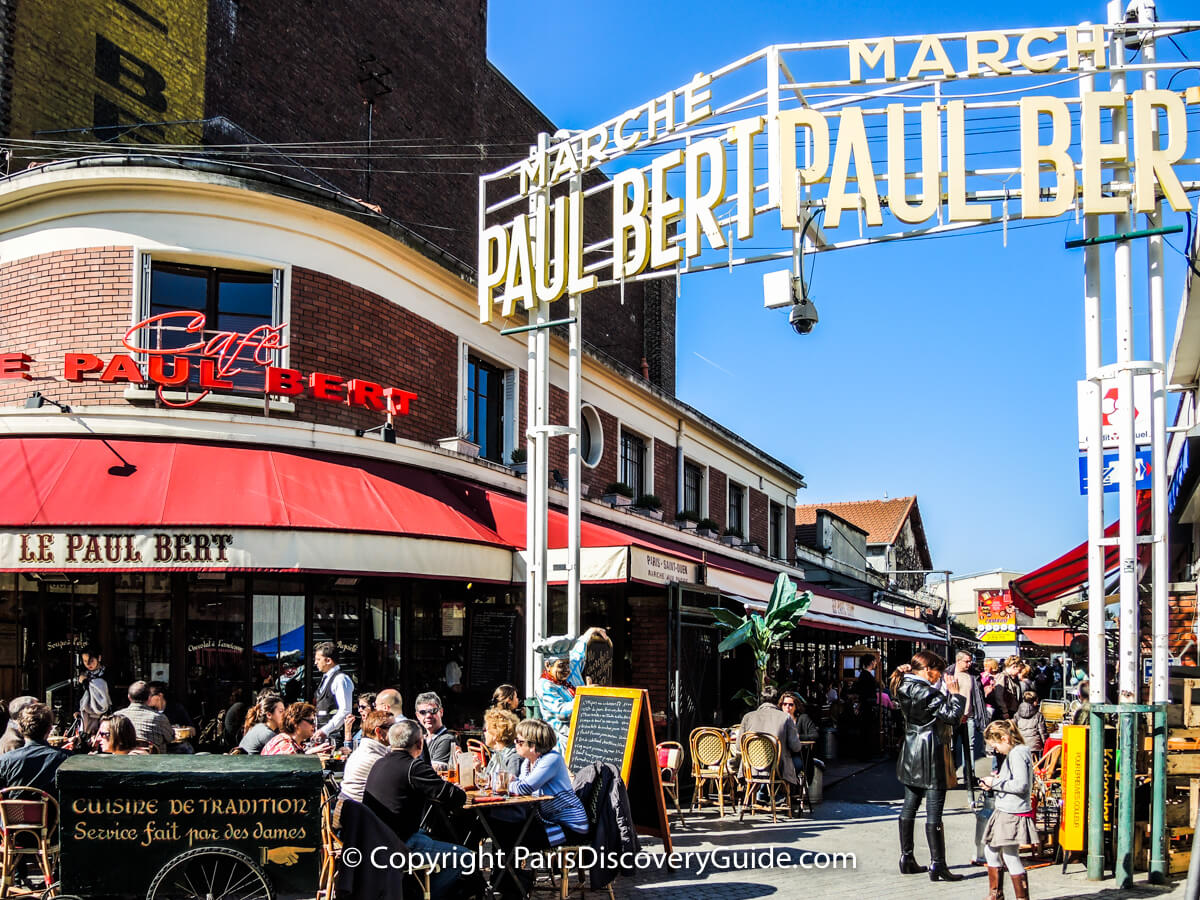
Café Le Paul Bert
You'll find Cafe Le Paul Bert (20 Rue Paul Bert) near the entrance of the Paul Bert-Serpette market. Go early to snag a seat on the sunny terrace, and recharge over wine and bistro food.
Unlike most Parisian eateries, service is very fast here, so you'll be back to shopping fairly quickly.
MOB Hotel Terrace Cafe
The Terrace Cafe at the MOB Hotel offers a wide range of casual food choices such as pizza and salads, with plenty of options for vegans and vegetarians. Relax on the terrace while you plan your next purchases.
See Tip 6 for the cafe's location.
La REcyclerie
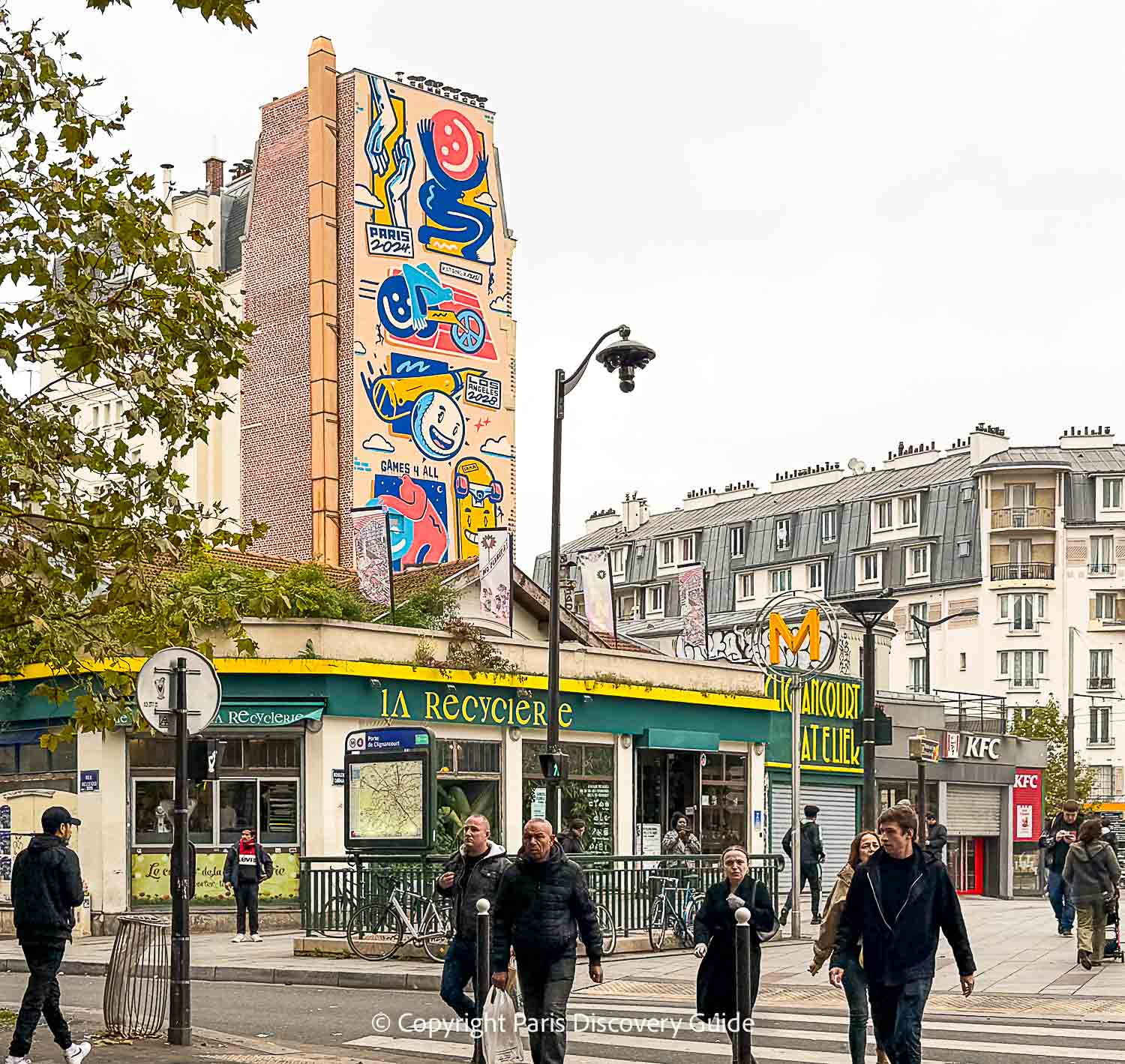
The REcyclerie (83 Boulevard Ornano, next to the Clignancourt metro station across from Les Puces), is a former train station repurposed as a cool multipurpose center focused on urban gardening, protecting the environment, and hosting concerts, community events, and workshops.
It also features a trendy restaurant known for its fresh veggie-centric cuisine, organic wines, occasional drop-ins by famous chefs, and no food waste (the onsite chickens get your leftovers.
Even though it's not actually in the market, it's my favorite place to stop for a drink, snack, or meal when I'm there.
As a bonus, there's even a Sunday vintage market.
Couscous, Sausisson, & More
You can follow your nose to find the many small cafes and bistros serving up tasty flea market fare scattered throughout the market and along Rue des Rosiers.
Top picks: North African couscous and sausages from the South of France and Spain, along with a glass or two or vin rouge.
Sadly, North African food has become less common here in recent years, but you can still find it (for now) if you look around, especially on Fridays.
Chez Louisette - RIP
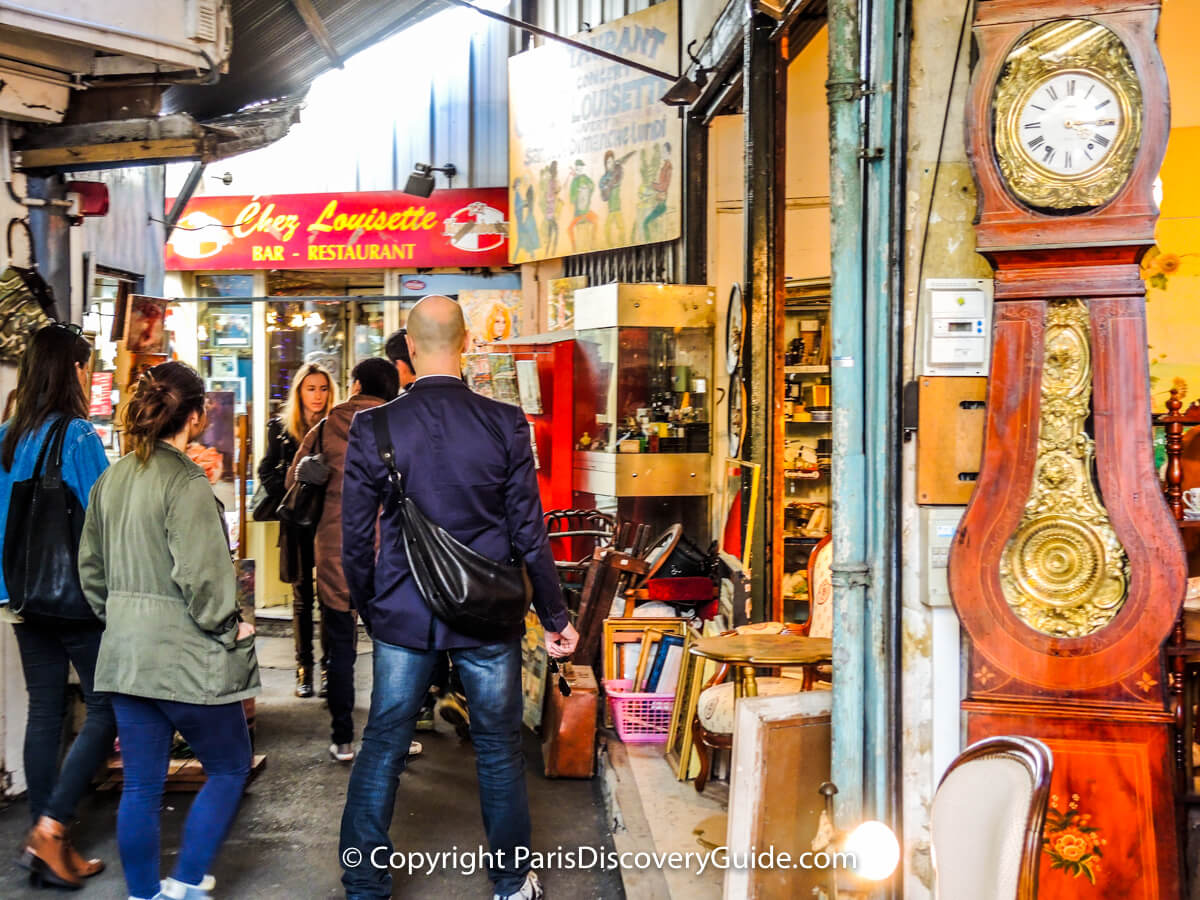
Tucked away in a far back corner of Marché Vernaison (the map in Tip 4 shows the location), Chez Louisette was a legendary guinguette-style cafe serving traditional French cuisine such as beef bourguignon.
Around lunchtime, you could hear accordion music and a singer who warbled her way through a repertoire of Edith Piaf songs.
When I spotted a sign saying "fermé" recently, I asked a nearby vendor what happened and learned that the owners, who had operated the cafe since the late 1960s, had died.
For awhile, the vendor told me, the owners' children had hoped to take it over but that didn't work out for unknown legal reasons (perhaps issues or restrictions with the lease?), it now appears that this legendary spot may be permanently closed.
As the vendor who gave me this information concluded, "Everything changes, even here."
Tip 9: How to Ship Your Paris Flea Market Purchase to Your Home
Shipping your Paris Flea Market purchases is actually much easier than you might expect.
Ask the dealer from whom you're purchasing for recommendations. Several professional shippers have offices at Les Puces, and Les Puces dealers have lots of experience with recommending the shippers best suited for what you're buying and where you live.
If you are on a private Flea Market tour, your guide may help you make arrangements with the shippers.
Best Les Puces Guided Tour
Tip 10: Where to Find Bargains at the Paris Flea Market
When you discover something you love and you're comfortable with the price, it's a bargain. The pleasure you get from it once you bring it home will far outweigh whatever you paid for it. Les Puces vast markets give you plenty of opportunities to find that kind of treasure.
However, if you're hoping for dirt-cheap prices or want to snag an unrecognized gem for a few Euros, Les Puces may not be your best option even if you're willing to dig through piles of mostly-uninteresting items offered by street vendors.
For a better chance at that kind of deal, try some of the smaller flea markets in Paris such as Marché d'Aligre, Vanves, or Montreuil, or some of the pop-up brocantes or rummage sales.
For higher-end vintage and antique items, also try Foire de Chatou in March and September.
More Paris Shopping Tours
These fun tours make shopping in Paris easy - and will give you great ideas about even more places to explore on your own:
Paris Hotel Map
Planning to visit Paris? Use this Paris hotel map to find accommodations and make your reservations:
Booking.comCheck out the newest Paris hotels
More Paris Shopping Articles
- Guide to Paris's Smaller Flea Markets - Marché de Aligre, Vanves, and Montreuil, plus Foire de Chatou.
- Paris Sales - 10 tips for scoring the best deals at the January and June sales
- Paris Christmas Markets - Where to find the biggest and best
- Best Areas in Paris for Shopping - From luxury designer showrooms to independent boutiques


